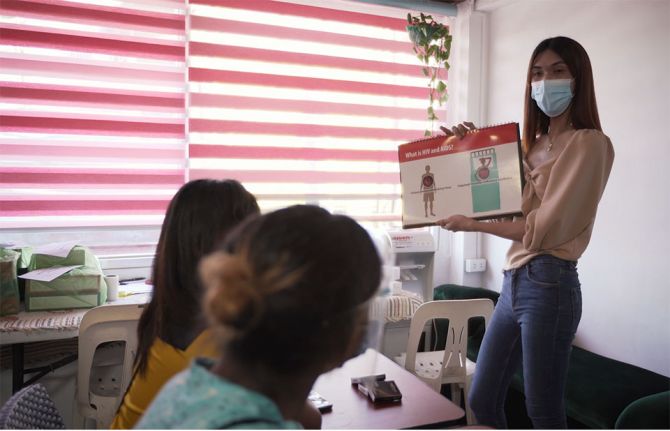

COVID-Blog
Status of HIV Programmes in Botswana
20 February 2025
20 February 2025 20 February 2025Documented Impact on Services:
Government Support: HIV programmes are primarily (60%) supported by the government, with public health facilities operating normally.
Service Disruptions: All key population drop-in centres are closed, limiting access to services.
Workload and Quality: Increased workload for government staff may hinder adequate monitoring of adherence and retention for clients on treatment. There is a risk of losing trained staff, which could lead to poorer service quality.

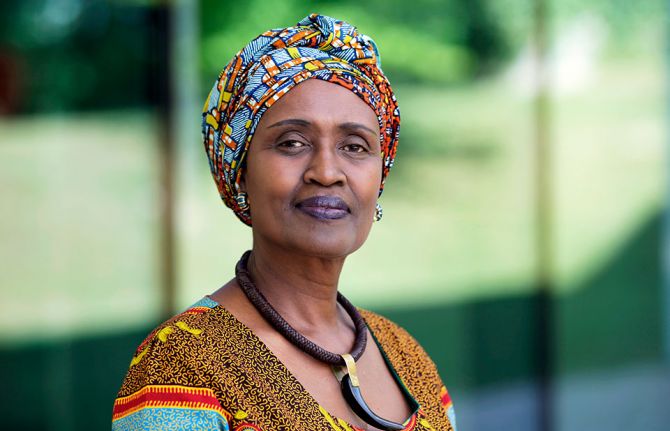
COVID-Blog
A global vaccine apartheid is unfolding. People’s lives must come before profit
03 February 2021
03 February 2021 03 February 2021This article first appeared in The Guardian
By Winnie Byanyima, UNAIDS Executive Director
Nine months ago world leaders were queuing up to declare any Covid-19 vaccine a global public good. Today we are witness to a vaccine apartheid that is only serving the interests of powerful and profitable pharmaceutical corporations while costing each one of us the quickest and least harmful exist route from this crisis.
I am sickened by last week’s news that South Africa, a country whose HIV history should have taught us all the most appalling life-costing consequences of allowing pharmaceutical corporations to protect their medicine monopolies, has had to pay more than double the price paid by the European Union for the AstraZeneca vaccine for far fewer doses than it actually needs. Like so many other low and middle-income countries, South Africa is today facing a vaccine landscape of depleted supply where it is purchasing power, not suffering, that will secure the few remaining doses.
Nine out of 10 people living in the poorest countries are set to miss out on a vaccine this year. Production delays put even this figure in doubt. Unjustifiably high prices block access and threaten to push more countries into an ever-deeper debt crisis. If we continue to pursue the vaccine model we have, we will fail to get this pandemic under control for years to come.
Failure to change course will come at the cost of millions of lives and livelihoods around the world; to our progress on tackling poverty; to businesses, including those represented here at the World Economic Forum this week; and to our collective public health and economic security. Because make no mistake, the costs of vaccine inequality will not be confined to those living in the poorest countries.
The longer the virus is allowed to continue in a context of patchy immunity, the greater the chance of mutations that could render the vaccines we have and the vaccines some people in rich countries have already received, less effective or ineffective.
Research commissioned by the International Chamber of Commerce published this week predicts that delays to vaccine access in poorer nations will also cost the global economy an estimated $9 trillion, with nearly half of this absorbed in wealthy countries like the United States, Canada, Germany, and the United Kingdom.
We cannot rewind the last nine months or the failure so far of governments to enact their pledge to make Covid-19 vaccines global public goods. But we can and we must act now to change the otherwise catastrophic trajectory of this pandemic. The vaccine science, know-how and technology paid for in large part by over $100 billion of taxpayers’ money, can no longer be treated as the private property of pharmaceutical corporations. Instead, these must be shared openly, via the World Health Organisation’s Covid Technology Access Pool so that more manufacturers can be brought on board and a global plan put in action to scale up vaccine production.
To clear the pathway for this, governments must also urgently back the proposal tabled to the World Trade Organisation to temporarily waive intellectual property rights for COVID 19 vaccines, treatments and tests until the world has reached critically needed herd immunity and this pandemic is under control.
Almost every business on the planet has had to step away from business as usual as a result of this pandemic. It is in all our interests that pharmaceutical corporations now do the same. I invite governments and business leaders to join the growing call for a People’s Vaccine and together chart a new path that can secure enough vaccines, tests and treatments for all people in all nations.

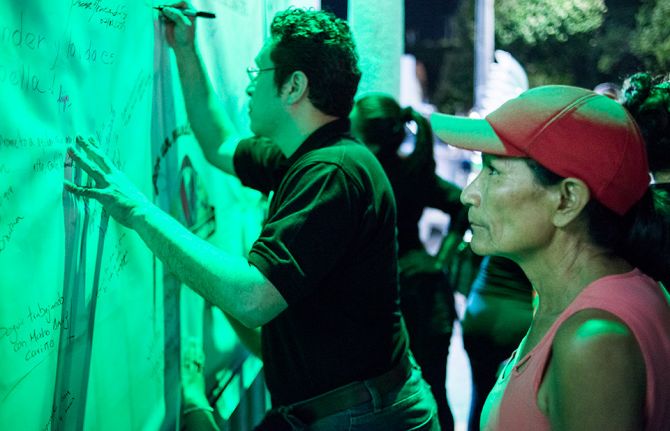
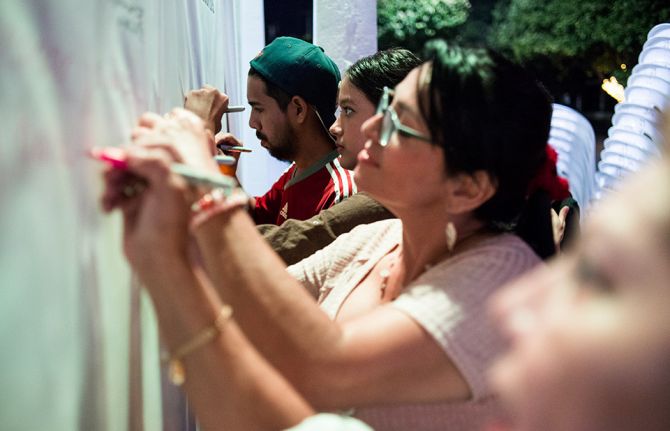
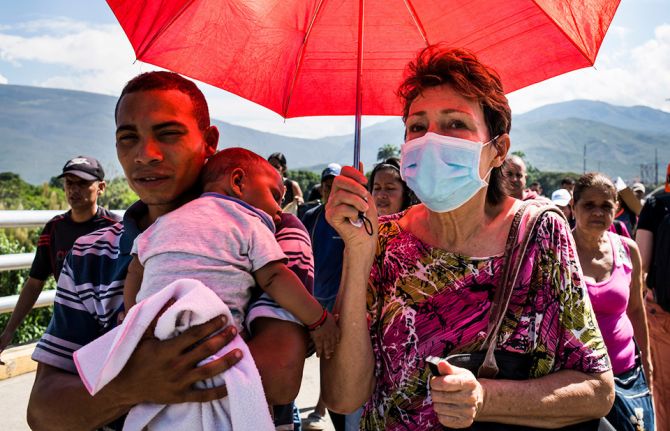
COVID-Blog
26 organizations to receive funding to address HIV and COVID-19 in Latin America and the Caribbean
07 October 2020
07 October 2020 07 October 2020As a result of the 2020 Call for Strengthening community-based organizations in the response to HIV in Latin America and the Caribbean in the context of COVID-19, UNAIDS received 133 project proposals that met the eligibility criteria of which 26 have now been selected to receive funding for their implementation.
Several online surveys conducted by UNAIDS in the region since the beginning of the COVID-19 pandemic have showed the diverse vulnerabilities of people living with or affected by HIV, not only in terms of COVID-19 prevention, but also in HIV prevention, access to treatment and human rights violations. Therefore, the selected projects are aimed at addressing the challenges that countries face when responding to the two converging epidemics of COVID-19 and HIV as well as strengthening the role of community organizations to mitigate the vulnerabilities of the people affected by the epidemics, including key populations and people living with or vulnerable to HIV.
The selected projects will be implemented in 16 different countries of the region including Argentina, Brazil, Chile, Colombia, Costa Rica, Dominican Republic, Ecuador, El Salvador, Guatemala, Guyana, Honduras, Mexico, Panama, Paraguay, Peru and Venezuela.

COVID-Blog
Providing HIV treatment to people living with HIV stranded in foreign countries in Middle East and North Africa region during the COVID-19 pandemic
08 September 2020
08 September 2020 08 September 2020Due to COVID-19 people living with HIV around the world, including the Middle East and North Africa region, are encountering difficulties to access HIV treatment, especially when they are unexpectedly stranded in a foreign country due to travel restrictions.
“I came to Egypt on 1 March on a business trip and my plan was to leave on 4 April. Due to the COVID-19 and the closing of the airports, I had to extend my stay in Egypt. Unfortunately, my medication is not available in Egypt,” said Hammad.
To overcome this challenge, UNAIDS has been coordinating efforts with governments, partners and civil society organizations to ensure everyone in need of HIV treatment could have access to it by linking people with local networks and mobilizing government officials in the Middle East and North Africa region.
In the case of Hammad, UNAIDS and WHO together with the Network of people living with HIV in Lebanon, coordinated the delivery of three-month stock of HIV treatment. “I’m really thankful for all the humanitarian parties who helped me during this crisis, I couldn’t have done anything otherwise,” said Hammad.
In Jordan, UNAIDS coordinated with its partner Forearms of Change to provide HIV treatment to two transgender women stuck in the country. “Due to the global situation of the coronavirus, I was stranded in Jordan and my pills ran out! But UNAIDS linked me and my friend with Forearms of Change and this amazing organization supporting people living with HIV helped solve this vital issue! I am very grateful to everyone who has given me tremendous help!” said Kasia.
“We are really happy to know that we managed to give support and happiness to these two women who were very frightened when we saw them because they were stranded in Amman due to the lockdown. Providing them with the needed medicine without any questions was the only thing that managed to put a smile back on their faces,” said Abdalla Hanatleh, Director of Forearms of Change in Jordan.
Supporting people living with HIV stuck in countries with strict travel restrictions remains a constant challenge.
“We are committed to continue ensuring that people living with HIV get the services they need,” said Rangaiyan Gurumurthy, acting UNAIDS Regional Director for the Middle East and North Africa region. “We would not have been able to do all this, if it weren’t for the successful partnerships with governments and other partners and the commitment of civil society organizations in the region.”
Since the COVID-19 pandemic hit, UNAIDS has helped stranded people to obtain HIV medicine in countries as diverse as Canada, China, Latvia, Myanmar, Ukraine, Egypt, Kuwait and Jordan.

COVID-Blog
New website with COVID-19 related resources for young key populations and young poeple living with HIV in Asia and the Pacific
27 August 2020
27 August 2020 27 August 2020The Interagency Task Team on Young Key Populations (IATT on YKPs) in Asia and the Pacific, with support from Youth LEAD, UNAIDS, UNICEF and UNDP, has launched its new website.
The aim of the website is to gather and bring together available information and guidance on COVID-19 focusing on young key populations (YKPs) and young people living with HIV (PLHIV) from Asia and the Pacific. The platform will serve as an online resource to document and communicate on the challenges YKPs face due to COVID-19 as well as their approaches in identifying gaps and solutions in their response to COVID-19.
Materials on the website include a wide range of resources for YKPs, such as personal stories, guidance on what young people can do to look after themselves and their communities during COVID-19 as well as a collection of best practices and strategic information on young key populations during COVID-19 that can be used for evidence-informed programming.

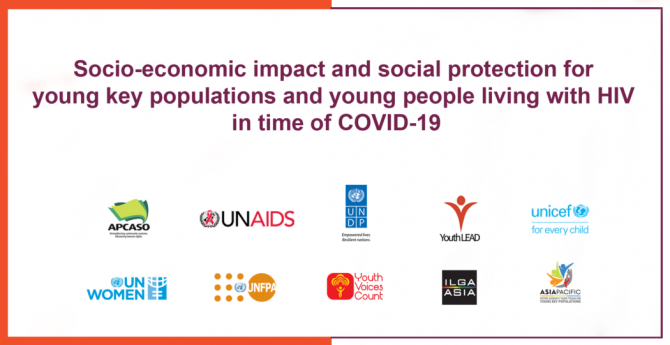
COVID-Blog
Restrictive measures to curb the spread of COVID-19 are affecting young key populations in Asia and the Pacific
27 August 2020
27 August 2020 27 August 2020The Interagency Task Team (IATT) on young key populations (YKPs) in Asia and the Pacific, co-chaired by UNAIDS, UNDP and APCASO, released the third set of findings from a survey assessing the needs and ability of young key populations to access information, treatment and other HIV services during COVID-19.
Findings from the assessment reveal that restrictive measures meant to curb the spread of COVID-19 have led to a loss of income and employment. Widespread quarantines have left many YKPs, particularly those working in the informal economy, without a source of income. 45% of the respondents stated that they did not have access to food supply and 10% did not have access to clean water during the COVID-19 outbreak. The pandemic is also having an impact on education systems. According to 36% of the respondents, the restrictive measures prevented them from accessing school or college.
In response to the COVID-19 pandemic, countries in Asia and the Pacific have sought to expand existing social security programmes or introduce new schemes, as advised by the International Monetary Fund. However, in several countries, there are still large gaps in coverage and the new schemes fall short of appropriately reflecting the devastating impacts that COVID-19 is having on the most vulnerable populations.
The IATT on YKP has developed a set of recommendations with a specific focus on YKPs and young people living with HIV addressed to governments and other stakeholders to strengthen social protection systems as a critical response to the COVID-19 crisis. Among others, the IATT on YKPs stressed that measures should include access to national social protection schemes, income support schemes and emergency social protection measures for all during the COVID-19 pandemic.

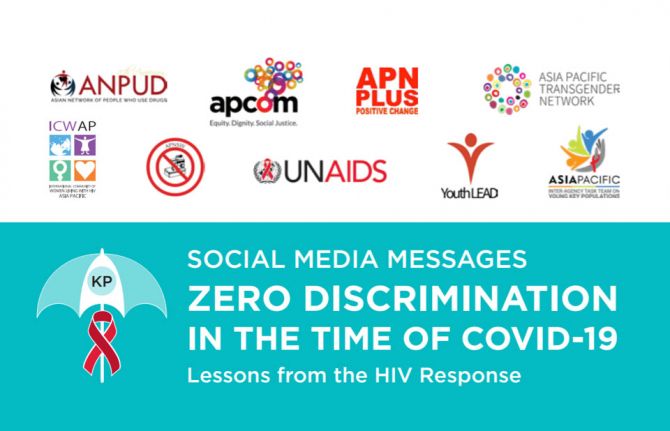
COVID-Blog
Social media against discrimination in Asia and the Pacific
24 August 2020
24 August 2020 24 August 2020In light of this rise of discrimination in Asia and the Pacific against vulnerable groups and health care professionals due to COVID-19, regional networks of key populations, including ANPUD, APCOM, APN+, APNSW, APTN, ICW AP and Youth Lead and the Inter-Agency Task Team on young key populations, have partnered with UNAIDS to develop a social media package and a set of key messages to advocate for a more respectful discourse on and offline.
Drawing on the lessons learned from the HIV response, the campaign is urging people to act with kindness, not stigma and discrimination, and respect people living with HIV, key populations and people affected by COVID-19.
Through this online campaign, key population networks and UNAIDS are calling on partners to promote inclusion, compassion, and the right of everyone to live a full and productive live with respect and dignity.

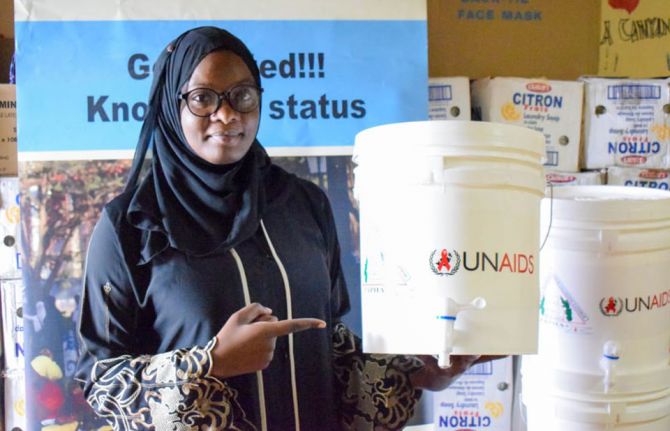
COVID-Blog
UNAIDS donates supplies and equipment to communities in Zanzibar
21 August 2020
21 August 2020 21 August 2020UNAIDS in collaboration with the Zanzibar Association of People living with HIV/AIDS (ZAPHA+), the Zanzibar HIV Control Program, the Zanzibar Ministry of Health and the local Shehia leadership, is supporting the government-led efforts to empower the most vulnerable, including people living with HIV, to prevent COVID-19 and other communicable diseases.
Recently, UNAIDS through ZAPHA+ donated bars of soap and buckets for handwashing stations to the Mtopepo* community, and personal protective equipment (PPE) such as surgical face masks and gloves to four health facilities in the district.
“UNAIDS believes that the ongoing COVID-19 prevention response has a lot to learn from the experiences of ZAPHA+ in serving communities,” said George Loy, UNAIDS National Programme Officer based in Zanzibar. “Working and supporting local communities is vital for preventing COVID-19 and other communicable diseases,” he added.
The support by UNAIDS will directly impact at least 2000 people in 480 households and is expected to indirectly benefit up to a total of 5000 people.
Fourteen volunteers, who are living with HIV, are being supported by UNAIDS to distribute the hygiene supplies, PPE and COVID-19 information materials in the community. The volunteers have been trained by ZAPHA+ to provide information on the coronavirus and other infectious diseases to the community.
*Mtopepo, a Shehia (sub-ward) in Magharibi district in the Urban/West region of Zanzibar, is an informal settlement with crowded living space and limited access to water and sanitation. This makes the residents particularly vulnerable to the spread of COVID-19.
Region/country
Related


COVID-Blog
Social media campaign highlights similarities between COVID-19 and HIV epidemics
31 July 2020
31 July 2020 31 July 2020In Fiji, UNAIDS in collaboration with the Fiji Positive Network and the Rainbow Pride Foundation, has launched a social media campaign showing the similarities of the current COVID-19 pandemic with the ongoing HIV epidemic. Drawing on the lessons learned from the HIV response, the campaign is urging people to act with kindness, not stigma and discrimination, and respect people living with HIV and affected by COVID-19 everywhere, including on social media. The campaign emphasizes the importance of respecting the right to privacy, ensuring that people’s identities and personal information are not released without their permission. The initiative includes the dissemination of postcards and key messages on social media.
Region/country

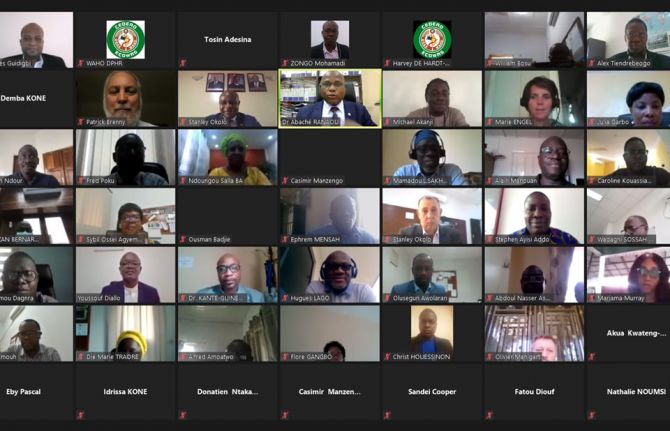
COVID-Blog
Virtual meeting on the impact of the COVID-19 on HIV programmes in the ECOWAS region
27 July 2020
27 July 2020 27 July 2020The West Africa Health Organisation (WAHO) organized, with support from USAID and UNAIDS, an online meeting with stakeholders in the Economic Community of West African States (ECOWAS) region—representatives of National AIDS Commissions, national AIDS and TB Coordinators in the Ministry of Health, and representatives from USAID, UN Agencies, civil society and the Global Fund—to share experiences and actions taken to mitigate the effects of COVID-19 on HIV programmes.
The discussions stressed the critical role that civil society is playing in mitigating the impacts of COVID-19 on HIV prevention, testing and treatment programmes, while at the same time, promoting the safety of staff and programme beneficiaries. A call was made for more political, technical, and financial support from governments and partners for community responses through delegation of tasks and decentralization of services.
Participants also agreed on the need to strengthen and pooling of laboratory resources and health products at the sub regional level as well as the need to establish a humanitarian corridor for the secure movement of health actors between borders and within countries specially in the multiple fragile situations in the region.
Other recommendations included expanding differentiated models of testing and care such as multi-month dispensing of HIV treatment and devising more effective ways to reach those left behind with equitable public and community services, including social safety nets, livelihood and economic empowerment programs, to mitigate both health and socio economic impact of COVID-19 and HIV.
The efficacy of using promising ICT innovations to reach key and vulnerable populations and to address critical programme and community needs, has been evidenced in all countries. A number of good practices were presented including the introduction or expansion of community antiretroviral distribution in Burkina Faso, Côte d’Ivoire, Guinea Bissau, Liberia, Mali, Nigeria, and Senegal; the increased use of peer supporters to improve linkages to care and create demand for services in Ghana; the virtual sensitization of key populations in Guinea Bissau; the use of WhatsApp to support counselling of people living with HIV in Togo; with the closure of bars, the renting of houses for sensitization activities and distribution of condoms in Guinea; the piloting of self- testing in Liberia; the opening of a hotline to communicate with people living with HIV, TB patients and key populations in Niger; the loan of antiretroviral drugs from The Gambia to Guinea Bissau to respond to stock outs; or the establishment of a supply chain situation room to ensure non-disruption in supply of HIV commodities at facility-level in Nigeria.

COVID-Blog
Pasig City signs Fast-Track Cities Initiative to scale-up the response to the HIV epidemic in the context of COVID-19
22 July 2020
22 July 2020 22 July 2020In the Philippines, the Mayor of Pasig City, Vico Sotto signed a declaration of commitment to implement the Fast-Track Cities Initiative (FTCI), which aims to scale-up the response to the growing HIV epidemic in the context of the COVID-19 pandemic.
Pasig City will proactively deliver quality services to everyone, including hard-to-reach populations, by increasing investments to scale-up HIV programs, establishing more treatment facilities and integrated social hygiene clinics, and training more healthcare providers to deliver HIV and COVID-19 services.
UNAIDS will provide technical support in the implementation of the strategy to ensure that efforts at the local level are strengthened to respond to COVID-19 and HIV, including scale up of testing and zero discrimination programmes for healthcare providers.
Learning from the HIV response, Pasig City is one of the cities that is providing COVID-19 testing to its residents, has introduced a loan program to revitalize the economy of small and medium enterprises, and established quarantine facilities providing food and medical care and other essential needs.
Region/country
Related


COVID-Blog
UNAIDS launches a call centre for people living with HIV in Zimbabwe
20 July 2020
20 July 2020 20 July 2020As the COVID-19 pandemic scales across Zimbabwe, there were numerous calls from global partners, including the United Nations Secretary-General, for the expanded use of tele-health and innovative technology solutions to limit congestion in health care systems and the adverse effects of potential disruptions to health care caused by lockdowns.
In response to the call, UNAIDS provided guidelines and financial support for the procurement of equipment and the training of online counsellors from the Zimbabwe National Network of People Living with HIV (ZNNP+) to establish a call centre to respond to inquiries from people living with HIV across the country.
The call centre platform is a national surveillance and information system which will ensure that challenges faced by people living with HIV are captured in real time and HIV services to boost COVID-19 testing, isolation, contact tracing and treatment are deployed efficiently.
The call centre will cover Zimbabwe’s ten provinces and will track specific indicators integrated into a data store which will assist in collating and analysing data received from the sub-national levels.
The collected data will be used to inform advocacy for issues like multi-month dispensing of antiretroviral medicines, access to viral load testing and access to HIV prevention and management.
“We welcome this initiative as it is user-friendly; people are able to call for free and have their issues addressed,” says Tatenda Makoni, Executive Director of ZNNP+.
The platform will assist the national network of people living with HIV in being proactive to serve the needs of its constituency. The platform will not end with COVID-19 but will focus on HIV services to boost testing, contact tracing and treatment capacities in Zimbabwe. Lessons learned from the call centre will be used to inform replication in other sectors and regions.
Region/country
Related


COVID-Blog
UNAIDS supports communities during COVID-19 outbreak in Kenya
20 July 2020
20 July 2020 20 July 2020UNAIDS has embarked on a project to support communities in Kenya during the COVID-19 pandemic.
The project has a two-pronged approach to provide short-term, urgent assistance and long-term, structural interventions to empower communities to respond to the immediate and extended impacts of COVID-19.
It also seeks to strengthen advocacy efforts aimed at government and partners to include the needs of vulnerable communities, including people living with HIV, key populations, adolescent girls and young women and pregnant and breast-feeding women, in COVID-19 response plans.
In the short-term, UNAIDS, in partnership with The National Empowerment Network of People living with HIV/AIDS in Kenya (NEPHAK) and Women Fighting AIDS in Kenya (WOFAK), is distributing food and hygiene packs to people living with HIV in informal settlements.
WOFAK is distributing food vouchers across six counties in Kenya, targeting 450 women and girls in all their diversity. The two organizations are together distributing hygiene packs, consisting of a three-month supply of soap and disinfectant, as part of a partnership between UNAIDS and Reckitt Benckiser, to 10 000 people living with HIV across Kenya.
Furthermore, UNAIDS is supporting community organizations with a grant of Kes. 7 400 000 (USD 69 256). These funds will not only purchase food vouchers, but also will support communities to meaningfully engage in the Global Fund application process, assess the impact of COVID-19, including human rights and gender violations during the pandemic, and support civil society organizations to develop key messages and consolidate their strategies while linking them to Kenya’s Ministry of Health.
Region/country
Related

COVID-Blog
Income generating initiatives to support the needs of sex workers in Fiji
20 July 2020
20 July 2020 20 July 2020In Fiji, UNAIDS donated cleaning equipment and gardening tools to an income generating project initiated by Survival Advocacy Network Fiji (SAN Fiji) to support the needs of sex workers who are facing hardships during the COVID-19 pandemic including loss of income.
SAN Fiji, an advocacy organization for the rights of sex workers, has been working with other organizations such as Strumphet Alliance Network, Haus of Khameleon and UNAIDS to implement income generating initiatives for sex workers including catering, grass-cutting services and general backyard cleaning.
Region/country

COVID-Blog
UNAIDS supports food assistance project for key populations in Rwanda
10 July 2020
10 July 2020 10 July 2020In Rwanda, restricted movement during the COVID-19-related lockdown has affected population groups differently, particularly sex workers, members of the LGBTI community, and households that survive on a daily income.
The most common challenge faced by key populations during lockdown is lack of food, particularly among people living with HIV and sex workers, which is most likely to exacerbate vulnerability to new HIV infections as the need to survive becomes heightened.
As a result, a coalition of four civil society organizations from within the Rwanda NGO Forum on HIV and Health Promotion, in collaboration with the District of Gasabo, in Kigali, Rwanda, has launched a three-month project called Turikumwe (which means “we are together” in Kinyarwanda).
With catalytic funds from UNAIDS and financial support from the European Union, the project will provide food assistance and sanitary equipment to people most affected by the COVID-19 pandemic in selected districts in Rwanda. The food and goods will be distributed by the coalition, through their local associations, to communities of LGBTI people, sex workers and young mothers affected by the COVID-19 lockdown. The project will reach 2 000 vulnerable people.
“Supporting the efforts of civil society, in collaboration with the Government of Rwanda, to reach communities of LGBTI people, sex workers and young mothers, ensuring that no one is left behind, is a key milestone for UNAIDS,” said Andrew Gasozi Ntwali, Community Support Advisor at UNAIDS Country Office in Rwanda.

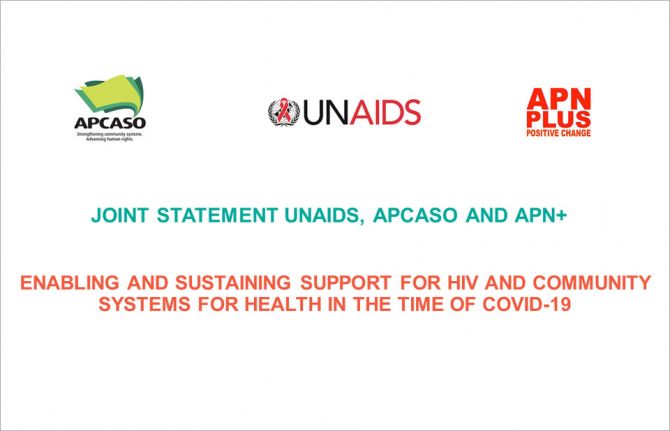
COVID-Blog
Joint statement by UNAIDS, APCASO and APN+ call for equitable systems for health in the context of COVID-19
02 July 2020
02 July 2020 02 July 2020In the context of the COVID-19 pandemic, UNAIDS, APCASO and APN+ issued a joint statement to emphasize the key role that the HIV response can play in developing and implementing equitable systems for health, including sustainable HIV and COVID-19 programming.
Vulnerable and marginalized people are often the most affected by COVID-19, physically, economically and socially. They are the least able to protect themselves, often living in crowded conditions without sufficient hygiene facilities or on the street. Due to restrictions imposed in response to COVID-19, women have faced increased rates of gender-based violence. Vulnerable and marginalized people are also the least likely to be able to access social protection measures designed to ensure access to basic food, hygiene and livelihood support.
The joint statement emphasizes that community-led responses must be a formally recognized element of any country’s responses to HIV and COVID-19. It also calls on governments and donors to ensure sufficient funding and political and legal support to networks of people living with HIV and key populations, community-based health services, and community and civil society service and advocacy organizations.

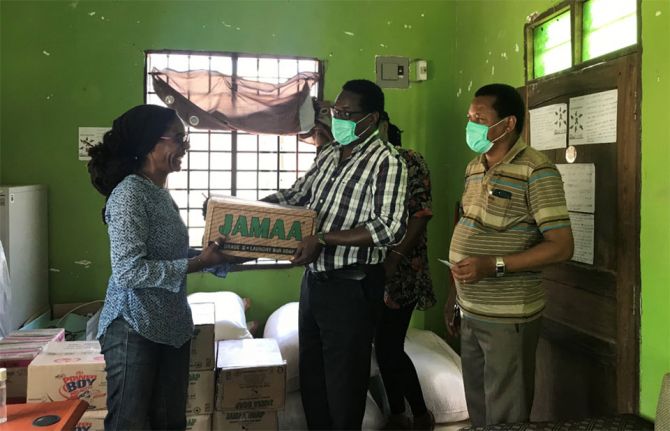
COVID-Blog
UNAIDS support to women who use drugs and their families in Tanzania to prevent COVID-19
30 June 2020
30 June 2020 30 June 2020In Dar es Salaam, Tanzania, the COVID-19 pandemic has amplified the struggle for those who are already marginalized and vulnerable. In densely populated areas and informal settlements, where many of the cities’ people who use drugs reside, social distancing is difficult and running water and sanitation infrastructure is sparse.
Many people who use drugs, especially women, make a living doing work in the informal sector, for example housework, sex work or informal trading. They are seeing their income reduce and life for them and their families becoming difficult.
Through the Tanzania Network for People who Use Drugs (TaNPUD), an umbrella for people who use and inject drugs with 11 partner organizations, UNAIDS is supporting people who inject drugs and recovering drug users and their families in 19 campsites, called “maskanies”, and one shelter in Dar es Salaam. TaNPUD, provides information and communication messages on COVID-19 and stigma and discrimination, basic hygiene supplies (buckets, soap and sanitizer) and basic food rations to last approximately one month for each family. The project is financially supported by UNAIDS.
“Life has changed dramatically for many,” says Happy Assan, Executive Director of TaNPUD and coordinator and co-founder of SALVALGE, a network for women who use drugs in Dar es Salaam. “Women report that they can't afford to provide for their families. Part time jobs that some used to do are not accessible any more as many don't want anyone to visit their homes for washing clothes or cleaning because of fear of COVID-19,” she added.
“The support from UNAIDS will be able to help about 25 families of women who use drugs with food, hygiene materials and soap, and also help to reach out to them to better understand what they are going through,” says Ms Assan.

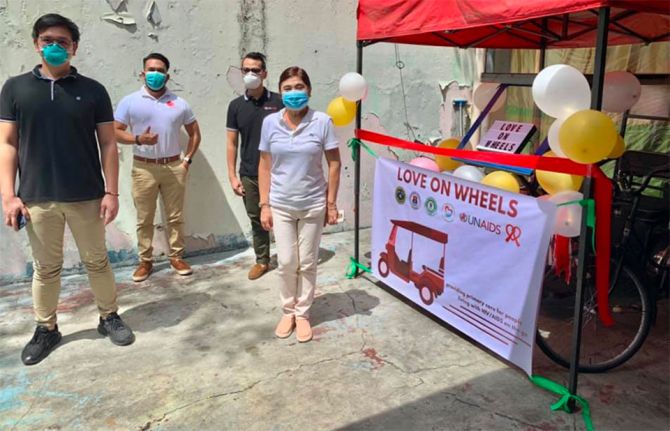
COVID-Blog
Love on Wheels: e-bikes to ensure continuity of HIV services to key populations
24 June 2020
24 June 2020 24 June 2020The non-governmental organization Project Red Ribbon in partnership with the Manila Social Hygiene Clinic and Treatment Hub launched the “Love on Wheels” initiative at the Manila Social Hygiene Clinic in Manila, in collaboration with UNAIDS and the Department of Health-Metro Manila Center for Health and Development (DOH-MMCHD).
As part of the initiative, which came about as a consequence of the lockdown measures put in place in response to COVID-19, Project Red Ribbon mobilized resources to buy e-bikes and other bicycles which they then donated to the Manila Social Hygiene Clinic to ensure continuity of HIV services to key populations.
Health volunteers as well as health professionals including medical technologist and nurses use the e-bikes to bring HIV services closer to the community, including door-to-door delivery of HIV treatment, HIV screening, information materials, condoms and lubricants, delivery of specimens and securing results from the STD and AIDS Cooperative Central Laboratory— where confirmatory HIV testing is being done.
The clients sign up or inform the health centre that they are unable to go to the facility and would prefer to have the services delivered to them.
The health facility also organizes outreach activities such as HIV awareness and testing in hot spots and targeted sites in coordination with local community-based organizations and other groups working in that area.
UNAIDS and DOH-MMCHD will be assisting with the monitoring and evaluation of the project.

COVID-Blog
Community-led responses in the time of COVID – UNAIDS global survey
24 June 2020
24 June 2020 24 June 2020UNAIDS is conducting a global survey of community-led organizations and networks who work in the HIV field, in order to learn about the impact that COVID-19 has had on their existing HIV work, as well as the new efforts they have been undertaking in relation to the COVID-19 pandemic.
The survey is specifically focused on organizations run by and for their communities, and the service delivery and advocacy these organizations may be undertaking with their governments related to COVID disruptions.
Service delivery for this survey is defined broadly, for example, services could include health education; outreach; ART delivery; supplying masks, soap and sanitizers; peer support for ART adherence; nutrition support; financial support; counseling, testing, and prevention services; support for harm reduction, including commodities and medications; psychosocial support; paralegal support; community-led monitoring; advocacy to protect and expand the space for communities to provide these services; and more.
The information derived from this survey will be used to generate a new UNAIDS report on the critical role and impact of HIV community-led responses as well the current challenges and opportunities they face.
The goal of the report is to demonstrate that community-led work is a linchpin for societal resilience and sustaining the HIV response. This information will also be made available to help plan and advocate for future programmes and funding on health crises and HIV.
The work that community-led organizations and networks are doing is more vital than ever in the context of the current crisis. Our hope is that, with this survey, we can raise awareness about the importance of community-led work and gain greater recognition and support for community-led initiatives.

COVID-Blog
UNAIDS supports call centre for people living with HIV in Rwanda
19 June 2020
19 June 2020 19 June 2020To respond to the challenges that the lockdown has caused for people living with HIV, UNAIDS provided financial and technical support to the Rwanda Network of People Living with HIV (RRP+) to establish a toll-free call centre. The purpose of the call centre is to share information about lockdown regulations and available HIV services in real time, at no cost.
Furthermore, people with possible non-communicable diseases were identified through the call line, referred to the nearest health facility and followed up by peer educators or service providers within the catchment area.
By the end of May 2020, the call centre had received 123 calls. Most callers were people living with HIV and peer educators, while a significant number of calls were also received from young people, female sex workers and gay men and other men who have sex with men.
“UNAIDS is pleased to support this innovative community-led approach for monitoring of community needs and efforts to respond to the prevailing challenges, with home grown solutions,” said Betru Woldesemayat, UNAIDS Country Director in Rwanda during a recent visit to the call centre.
The main inquiries to the call centre were about lack of access to HIV treatment and food. Other callers requested information about RRP+’s interventions during COVID-19 and 2% of calls were related to violence against women and children.
Through the call centre, RRP+ has identified areas of ongoing advocacy, including lack of food support, lack of masks and hygiene kits to prevent COVID-19 and supporting people living with HIV who are currently out of the country with no access to medicines. Furthermore, youth groups are no longer receiving monthly fees and incentives to provide peer support and mobilize young people to access HIV services. UNAIDS is working RRP+ to follow up on these issues.

COVID-Blog
Assessing the impact of the coronavirus pandemic among women and girls living with HIV in Asia and the Pacific
16 June 2020
16 June 2020 16 June 2020As part of a regional initiative supported by UNAIDS, the International Community of Women Living with HIV and AIDS for Asia and the Pacific (ICW AP) has launched a survey to assess the impact of the coronavirus pandemic among women and girls living with HIV.
A quick and informal assessment conducted by ICW AP in several countries has already revealed that it has been extremely challenging for women and girls living with HIV to obtain clear and accurate information about how to protect themselves and their families from COVID-19 as well as the precautions they need to take for the longer term as the pandemic continues.
The informal assessment has also shown that many women living with HIV are working in informal settings and, due to lockdown and restrictions of movement, they are not able to earn money to support themselves and their families.
The regional survey that has been recently launched aims to assess the realities on the ground of women and girls living with HIV and to gather information around issues such as experiences of gender-based violence, livelihood, access to social protection schemes, HIV treatment, sexual and reproductive health services and other needs.
The findings of the survey will inform a regional position paper to advocate for the rights and needs of women and girls living with HIV during the COVID-19 pandemic in Asia and the Pacific.

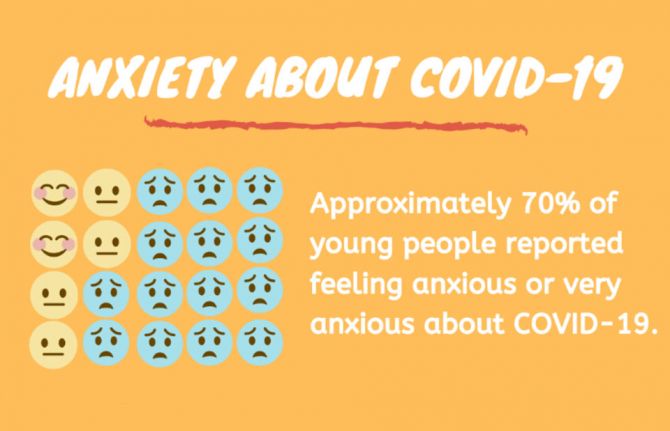
COVID-Blog
Impact of COVID-19 on mental health and quality of life of young key populations and young people living with HIV in Asia and the Pacific
12 June 2020
12 June 2020 12 June 2020The Interagency Task Team (IATT) on young key populations (YKPs) in Asia and the Pacific, co-chaired by UNAIDS, UNDP and APCASO, released the second set of findings as part of the survey assessing the needs and ability of young key populations to access information, treatment and other HIV services during COVID-19.
These results show the impact that COVID-19 is having on the mental health and quality of life of young key populations and young people living with HIV in Asia and the Pacific.
According to the survey, the uncertainty generated by the COVID-19 is increasing the levels of stress and anxiety of young key populations and is having a direct impact on their mental well-being. Approximately 70% of respondents reported feeling anxious or extremely anxious and half of the young people living with HIV who completed the survey, noted that counselling for anxiety, depression, or other conditions was essential to adhering to their HIV treatment. Another 23% highlighted that peer support and connection with other people living with HIV was a vital service.
Among young people who reported needing mental health services, 34% had experienced delays or disruption in access to mental health medications due to COVID-19 and 47% had experienced delays or disruption in accessing psycho-social support as a result of the ongoing pandemic.
Based on the results of the survey, the IATT on YKPs made a set of key recommendations on mental health support. Read the survey results and recommendations here

COVID-Blog
UNAIDS speaks to REDLACTRANS regional coordinator Marcela Romero about the human rights of the LGBTI population in times of COVID-19
08 June 2020
08 June 2020 08 June 2020UNAIDS Regional Director for Latin America and the Caribbean, César Núñez spoke with REDLACTRANS regional coordinator, Marcela Romero about the risks and the situation of LGBTI people, especially trans people, in Latin America and the Caribbean during the COVID-19 pandemic. Ms Romero highlighted some of the actions that civil society networks have taken to support those that have lost their means of subsistence due to the coronavirus response.

COVID-Blog
COVID-19 lockdown in Wuhan: Community group delivers HIV medicine
08 June 2020
08 June 2020 08 June 2020Once COVID-19 broke out in Wuhan, China’s Central Hubei Province, and the city went into strict lockdown, a group of volunteers acted swiftly to ensure people living with HIV had access to treatment.
Hui Hui is one of the volunteers with the Wuhan LGBT Center. He and others began shipping deliveries of treatment for people living with HIV who were stranded without access to their daily medicine.
But first they had to brave the checkpoints, go to the hospital with prescriptions and then pick up all the medicine. Once that was done, volunteers at the LGBT Center sorted through all the packs and shipped them out.
At the end of March, the center delivered treatment for nearly 3,000 people.
The Center also opened a hotline counselling service which has reached more than 5,000 people and counting.
UNAIDS helped financially and technically the Wuhan LGBT Center to deliver medicine to people living with HIV during the lockdown.

COVID-Blog
UNAIDS collaborates with private sector in Eswatini to disseminate information on COVID-19
04 June 2020
04 June 2020 04 June 2020UNAIDS collaborated with the Swaziland Business Coalition on HIV and AIDS (SWABCHA), the Ministry of Health and the National Emergency Response Council on HIV and AIDS in Eswatini, to produce a video that creates awareness among the work force on COVID-19 prevention.
The video, which will be aired through private sector channels and social media platforms, is one of the tools that will be used in the country to ensure that the work force is reached with relevant information on the prevention of the spread of COVID-19 in the workplace. It provides useful information on safety measures to take in the workplace, including conducting virtual meetings and hygiene measures to take when at work.
“The COVID-19 pandemic is a difficult time for all of us and the health and safety of our workforce is a priority,” says Thobile Dlamini of SWABCHA. “Now more than ever, we must do what the Ministry of Health and the World Health Organization are telling us to do,” she says.
UNAIDS in Eswatini has had a long-standing relationship with SWABCHA, an independent, non-profit organization that brings together private sector companies, unions, government, civil society and development partners to ensure an effective national private sector response to HIV.
Over the years, UNAIDS has provided technical and financial support to SWABCHA for several projects, including its wellness forums, the development and review of strategic plans, expanding HIV testing and treatment among seasonal workers and documentation of the private sector response. This focus has now widened to include the response to the COVID-19 outbreak.

COVID-Blog
A joint UN statement calls on UN Member States to permanently close compulsory drug detention and rehabilitation centres
01 June 2020
01 June 2020 01 June 2020Many countries in East and Southeast Asia have compulsory detention centres in the name of “treatment” for people who use drugs.
A Joint UN Statement on compulsory drug detention and rehabilitation centres in Asia and the Pacific in the context of COVID-19, signed by regional directors of 13 United Nations agencies from 16 regional offices in the region, calls on UN Member States to permanently close compulsory drug detention and rehabilitation centres and implement voluntary, evidence-informed and rights-based health and social services in the community.
The Statement was prepared by the UNAIDS regional office in partnership with OHCHR Asia as part of advocacy efforts to transition to voluntary community-based treatment and services for people who use drugs.
Regional Directors of 13 UN agencies from 16 regional offices in #Asia #Pacific appeal to UN Member States that operate compulsory drug detention & rehabilitation centres to close them permanently as an important measure to curb the spread of #COVID19 https://t.co/FoyhkCJc1V pic.twitter.com/85G8Qhxv0L
— UNAIDS Asia-Pacific (@UNAIDS_AP) June 1, 2020

COVID-Blog
Informal traders in Namibia given a lifeline during COVID-19 pandemic
29 May 2020
29 May 2020 29 May 2020The restrictions imposed in Namibia in response to COVID-19 meant that thousands of informal traders, who sell prepared food and fresh fruit and vegetables at markets, lost their livelihoods.
To mitigate economic losses, the government relaxed regulations in mid-April, allowing traders to sell certain essential goods, while taking the necessary precautionary measures against COVID-19.
The City of Windhoek requested UNAIDS’ support in the reopening of its markets. In preparation, UNAIDS convened the City of Windhoek and the Ministry of Health’s community care workers and the Namibia Informal Sector Organization (NISO), which promotes the rights of informal traders. They developed guidelines and conducted trainings for the informal traders. They also developed key messages on environmental, food and hand hygiene as well as social distancing, which were used in the training. Lastly, markets were disinfected and demarcated to allow for social distancing.
“Informal traders, most of whom are women, are a critical part of the economy in Namibia and are vulnerable because of the instability of their income. UNAIDS is pleased to play a role in ensuring that they are able to return to work and provide for their families in the safest way possible,” said Alti Zwandor, UNAIDS Country Director in Namibia.

COVID-Blog
Civil society organizations in Kenya call for a response to COVID-19 that respects the rights and dignity of all
26 May 2020
26 May 2020 26 May 2020In Kenya, UNAIDS and the United Nations Development Programme (UNDP) brought together representatives of civil society organizations from the people living with HIV, women’s and human rights sectors to discuss their experiences during the COVID-19 pandemic.
Participants raised concerns about the use of criminal law to restrict people’s movements and incidents of police brutality to enforce the state-imposed curfew.
As a result of this meeting, they issued an open letter to the Government of Kenya, asking for a response to COVID-19 that puts communities at the centre and respects the rights and dignity of all. They called on the government to do what works for HIV prevention and treatment, rather than developing disproportionate and coercive approaches.
“UNAIDS is advocating for a COVID-19 response that is grounded in the realities of people’s lives and focused on eliminating the barriers people face in being able to protect themselves and their communities,” said Medhin Tsehaui, UNAIDS Country Director in Kenya. “We need to act with empathy so that people can act without fear of losing their livelihood, food security and the respect of their community.”
UNAIDS has also provided technical support to the The National Empowerment Network of People living with HIV/AIDS in Kenya to develop messages on COVID-19 for people living with HIV to be distributed to its members.
Related post - Congregational health messages on COVID-19 for religious leaders

COVID-Blog
Lessons from the HIV response against COVID-19
21 May 2020
21 May 2020 21 May 2020CNN Philippines interviewed the UNAIDS Regional Director for Asia and the Pacific, Eamonn Murphy about the lessons learned from the HIV response that can be applied to Covid-19.

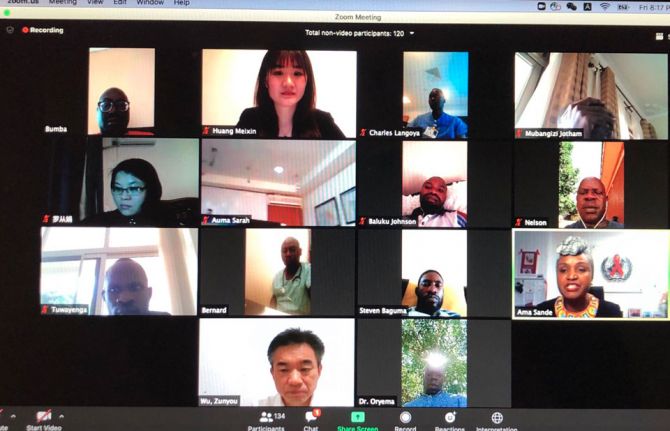
COVID-Blog
UNAIDS brings together Chinese and African health practitioners to share COVID-19 experiences
21 May 2020
21 May 2020 21 May 2020As COVID-19 cases in Africa continue to rise, there is an increasing demand from African countries for information sharing to better prepare for the outbreak of the virus.
UNAIDS and WeDoctor organized a webinar bringing together health practitioners from China, Uganda and South Sudan to share experiences and knowledge in COVID-19 prevention and treatment.
“Fortunately, the eastern and southern African region has had time to prepare for the virus and this gives us the advantage to learn from the experience of countries that have gone through the journey successfully. Today is an opportunity to share this expertise,” said Aeneas Chuma, Director of the UNAIDS Regional Support Team for Eastern and Southern Africa a.i..
Wu Zunyou, Chief Epidemiologist of the Chinese Center for Disease Control and Prevention, and Luo Congjuan, Chief Physician from the Affiliated Hospital of Qingdao University, shared their frontline experience in COVID-19 containment. They were joined by approximately 180 health professionals from Uganda Medical Association and South Sudan Doctors’ Union.
Mr Wu gave detailed account of how the pandemic broke out in China, the measures taken to stop the spread of the virus, and how makeshift hospitals work. He and Ms Luo also outlined what made China’s success in controlling COVID-19, what experiences Africa can adopt, and what main challenges exist with diagnostic tests.
The webinar was the second of its kind organized by UNAIDS and WeDoctor, a medical service provider from China; the first being an interaction with the Kenya Medical Women’s Association in April.


COVID-Blog
How COVID-19 has affected the needs of young people living with HIV and young key populations in Indonesia
20 May 2020
20 May 2020 20 May 2020Inti Muda, the Indonesian young key population network, and UNAIDS conducted a survey to assess the needs of young key populations and young people living with HIV (PLHIV) in Indonesia.
The survey found that, due to the COVID-19 measures, 81,5% of the respondents are struggling to sustain their livelihood as they are experiencing loss in their business due to lack of customers, being laid off from work, and the inability to do sex work.
The availability and security to access antiretroviral treatment is seen as an urgent need during this time by the 61% of the respondents who are on antiretroviral treatment. It is concerning that 44% of young people living with HIV have less than 1-month supply of treatment.
A set of recommendations were developed to address the issues found in the survey, including the need to ensure provision of food and other social protection services including shelter for vulnerable populations; explore possibilities to work with local health facilities to lessen frequency of visits in times of COVID-19, including through multi-month dispensing of HIV treatment; and ensure ability to access to counsellors and peer supports virtually.
For more information, check out the full report

COVID-Blog
UNAIDS Executive Director, Winnie Byanyima urges leaders meeting at the 73 World Health Assembly to commit to a peoples vaccine
18 May 2020
18 May 2020 18 May 2020We must not repeat what happened with AIDS treatments where for years those who could not afford them were left to die. @Winnie_Byanyima urges leaders meeting at #WHA73 to commit to a #PeoplesVaccine, owned by humanity, free for everyone. pic.twitter.com/ayAFnyJ2xD
— UNAIDS (@UNAIDS) May 18, 2020

COVID-Blog
UNAIDS negotiates support for frontline GBV counsellors during COVID-19 response
18 May 2020
18 May 2020 18 May 2020Workers on the front lines of the COVID-19 response include not only doctors, nurses and community health workers, but also counsellors and case workers dealing with women and children who have experienced violence in their homes and communities.
As South Africa responded to COVID-19 with a national lockdown, there has been a surge in reports of gender-based violence (GBV). Among the first to know were hotline and online counsellors, helping women and children to cope with violence and find safety.
GBV was already a serious issue in the country and the increase in reported cases placed new pressure on support services and their staff and volunteers. It was recognized that counsellors and case workers could benefit from mental health support to cope with the added pressure.
UNAIDS country office staff working in Kimberley, Northern Cape, approached the ‘Kimberley Supervision Group’, a collective of licensed psychologists operating private practices, to provide pro bono mental health support services to frontline workers. The group developed programmes to reinforce psychological resilience and increase the capacity of GBV shelter carers and counsellors to work with clients who lack access to their usual support networks during the pandemic response.

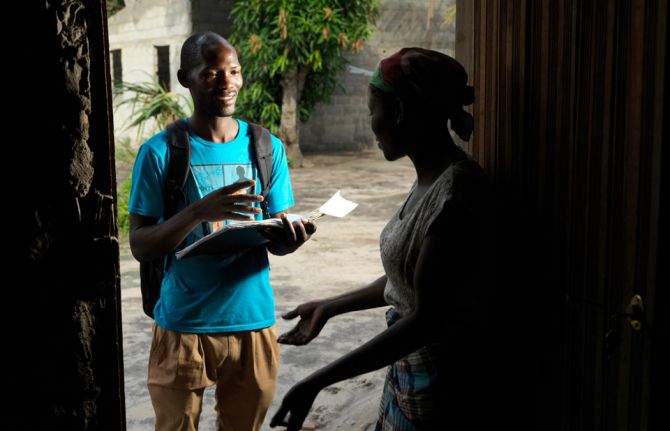
COVID-Blog
UNAIDS urges governments to ensure that HIV service providers from community-led organizations are recognized as essential service providers in the context of COVID-19
18 May 2020
18 May 2020 18 May 2020GENEVA, 18 May 2020—A cornerstone of the response to HIV, community-led health service delivery has become even more critical in the context of COVID-19, as the needs of marginalized community members and the burden on the health sector are increasing, making it vital that continued provision of HIV, tuberculosis and other health services is secured. Community-led organizations are providing a lifeline to underserved, marginalized and hard-to-reach populations around the world.
Physical distancing restrictions have created significant challenges for those needing to access essential services, creating an increased burden on community organizations, which are at the centre of service delivery.
UNAIDS recognizes that community organizations have an unparalleled depth of experience in creating and delivering responses to health and human rights crises within their communities. The many community-led networks and groups that emerged to respond to HIV possess immense practical experience, organizational strength and unparalleled community access for facilitating the delivery of life-saving support, and for influencing people’s real-life practices to better protect their health.

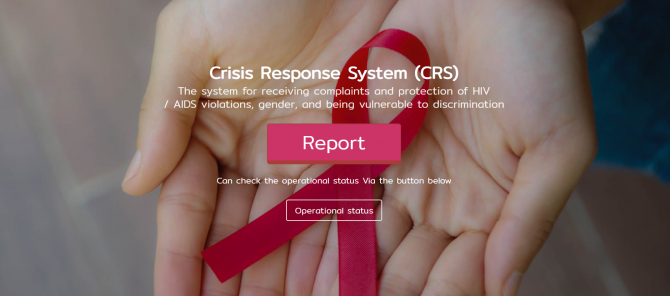
COVID-Blog
An online tool helps report human rights violations during COVID-19 in Thailand
15 May 2020
15 May 2020 15 May 2020In Thailand, UNAIDS is working with civil society networks to monitor and report cases of violence and other human rights violations among key populations and people living with HIV during the coronavirus pandemic.
Using an online tool, community members can report to a “crisis response team” human rights abuses and other forms of discrimination including physical violence, disclosure of HIV status or being tested for HIV without consent, and discrimination at the workplace and at school. The team consists of a multi-disciplinary group of people such as community health workers, health care providers, social workers, lawyers and police officers that can provide immediate assistance including social and health support, mediation with management level at the workplace or education institutes as well as arranging for volunteer lawyers to support victims in court.
At the end of April 2020, 122 case were reported to the CRS team, a significant increase since the implementation of the lockdown measure in the country.
This initiative is based on an already existing community-led crisis monitoring and response group supported by UNAIDS to monitor human rights abuses in the response to HIV in partnership with MOPH and Foundation on AIDS rights (FAR). It also serves as a good example on how HIV related interventions can be applied to the response to COVID-19.

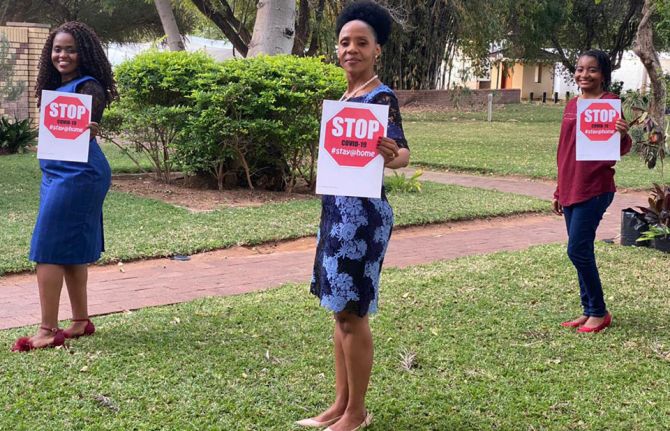
COVID-Blog
UNAIDS Special Ambassador, Neo Masisi, issues awareness message on COVID-19 to young people and people living with HIV in Botswana
14 May 2020
14 May 2020 14 May 2020The First Lady of Botswana and UNAIDS special ambassador for the empowerment and engagement of young people in Botswana, Neo Masisi, has partnered with UNAIDS, young people and people living with HIV to produce a series of videos on COVID-19. The videos have been broadcast on Botswana national television.
“I cannot overemphasize the importance of staying informed,” said Ms Masisi. “As they say, knowledge is power. I encourage people to get their facts from reliable sources.”
In the videos, Ms Masisi outlines the importance of young people and people living with HIV to protect themselves against COVID-19 and to adhere to guidelines outlined by the World Health Organization and the Ministry of Health and Wellness in Botswana.
These include staying at home, practising social distancing, and washing hands. Furthermore, the videos also provide advice to young people on how to stay physically and mentally healthy during this period.
“By doing this video, I wanted to motivate young people in this period of uncertainty – to say, what you can do when you feel anxiety, how to remain productive as a young person and to take care of those around you,” said Lilian Moremi, a career coach for young people who appears in the video alongside Ms Masisi.

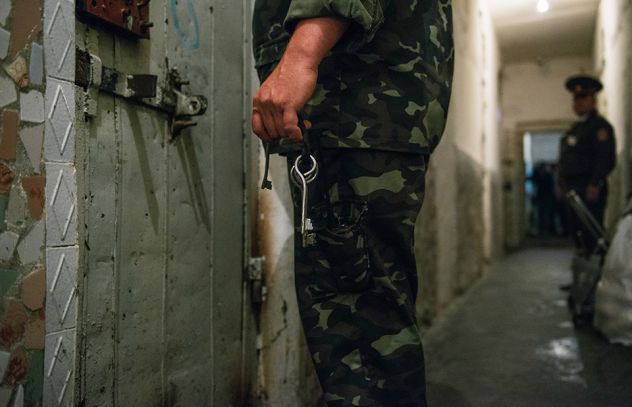
COVID-Blog
COVID-19 in prisons—a ticking time bomb
13 May 2020
13 May 2020 13 May 2020With more than 11 million people in custody worldwide, and 30 million people entering and leaving detention every year, the threat of COVID-19 for people in prisons is very real. In the vast majority of the world’s overcrowded and underfunded prisons and detention centres, physical distancing is simply not an option. In situations where close confinement, shared facilities and spaces and poor hygiene are commonplace, inmates and prison staff are living in constant fear of the ticking COVID-19 time bomb.
UNAIDS, the Office of the United Nations High Commissioner for Human Rights, the World Health Organization and United Nations Office on Drugs and Crime are calling on leaders to make detention a last resort, to close drug rehabilitation detention centres and to decriminalize sex work, same-sex sexual relations and drug use. They are urging countries to release the people who can be released and to consider people at risk of COVID-19, such as older people and people with pre-existing health conditions. Other people, including people sentenced for minor, non-violent offences, pregnant women, women who are breastfeeding and children, should also be considered for release.
Read related blog post - Massive prison amnesty in Myanmar in response to COVID-19


COVID-Blog
UNAIDS ensures continuity of HIV treatment for people living with HIV in Botswana
11 May 2020
11 May 2020 11 May 2020In March 2020, a stock-taking exercise led by UNAIDS, UNICEF and UNFPA, together with the Ministry of Health and Wellness of Botswana and the Central Medical Stores, assessed the availability of antiretroviral medicines, condoms and other contraceptives in the country in anticipation of the COVID-19 restrictions.
The exercise revealed that Botswana required more stocks of ARVs to comply with the three-month dispensing policy set by the government, and that, if a solution were not found, the country would run out of antiretroviral medicines.
As the regular suppliers were not ready to meet the delivery schedules and the major international producers located in India and China were facing restrictions of their own due to lockdowns, the Ministry of Health and Wellness reached out to UNAIDS for assistance in rapidly procuring antiretroviral medicines for the country.
UNAIDS leveraged its partnership with the private sector and contacted different manufactures to gauge their capacity to provide the treatment on time. Botswana needed to acquire 2.3 million doses of adult medication for meeting its needs for the next 9 months.
Even though some pharmaceutical companies had stocks available, restrictions of movement due to the coronavirus pandemic made the delivery impossible. In the end, UNAIDS managed to negotiate with CIPLA the direct procurement of 1 million dosages of medication which was available in their factory in Uganda. UNAIDS negotiated with CIPLA to keep its regular price. The consignment was delivered by truck to Botswana. The rest of the needed medication will be procured by UNICEF through the regular suppliers.
By proactively leading the stock-taking exercise and leveraging its convening capacity, UNAIDS managed to work with the government and the private sector to ensure continuity of HIV treatment for people living with HIV in Botswana.

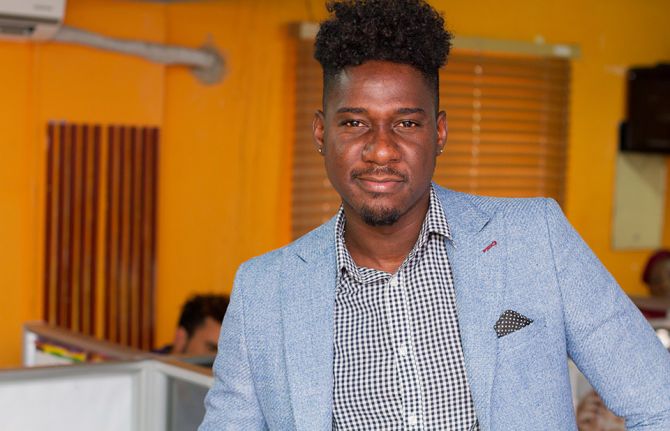
COVID-Blog
Combatting COVID-19 discrimination in Jamaica
08 May 2020
08 May 2020 08 May 2020Community organizations have reported that some COVID-19 stigma has even been directed to people living with HIV. UNAIDS Jamaica has been working to raise awareness among policymakers and through the news media about the importance of building trust with affected people while combatting stigma and discrimination among the wider population.
“Just as with HIV, success in combatting COVID-19 absolutely depends on people’s willingness to get tested and access care. Verbal abuse, violence and intimidation will only chase people away from services,” said Manoela Manova, UNAIDS Country Director for Jamaica.

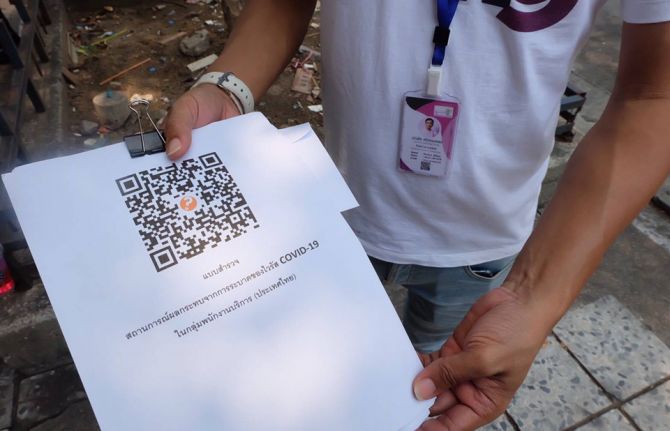
COVID-Blog
Supporting sex workers during the COVID-19 pandemic in Thailand
07 May 2020
07 May 2020 07 May 2020Sex workers in Thailand are facing loss of income and becoming increasingly vulnerable as a result of the restrictive measures put in place to respond to the coronavirus pandemic. Most Thai sex workers are not eligible for the social protection measures included in the government’s stimulus package while non-Thai sex workers don’t have access to any support.
In order to fully assess the impact that COVID-19 is having among sex workers, a community-led rapid assessment was launched in Thailand with support from UNAIDS.
Using a combination of on-line and telephone interviews with sex workers and representatives of sex worker networks around the country, the data collected will be used by UNAIDS to advocate for emergency support to sex workers at local level including leveraging individual donations as well as support from bilateral donors for sex worker-led communities.
The findings will also feed into the United Nations country team’s socio-economic impact assessment and will inform the development of recommendations for immediate actions to support the sex workers’ access to health and livelihoods during COVID-19.

COVID-Blog
New platform for a coordinated response against COVID-19 launched in Central African Republic
06 May 2020
06 May 2020 06 May 2020In the Central African Republic, civil society organizations have launched "Solidarity for action"—a platform created by associations of people living with HIV, sex workers and LGBTI organisations, TB and malaria activists, and human rights groups—to ensure mobilization and coordinated actions to reduce the vulnerability of these populations to COVID-19 and ensure continued access to HIV services, tuberculosis and malaria and respect for human rights in an unprecedented global crisis.
The creation of the platform was led by UNAIDS with support from UNICEF, IOM, UN women and WHO. The platform will be funded by the Global Fund through the reprogramming of savings from the current grant.
Solidarity in action. Great 2 join civil society, people living with HIV, TB & Malaria, human rights groups to lunch Platfrom 4 synergy to adress COVID-19, HIV, TB, Malaria. Stressing rights & community solutions https://t.co/ZH1IqFOwYq. @UNAIDS @UNICEF_CAR @IOM_CAR @ONUFemmes pic.twitter.com/OdUEzJdXX1
— Patrick Eba (@EbaPatrick) May 5, 2020

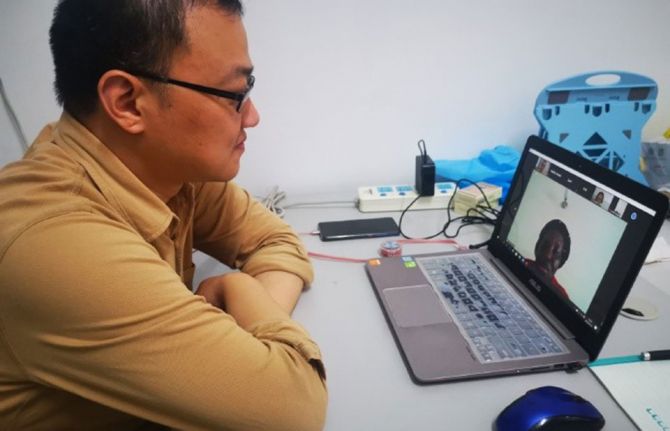
COVID-Blog
UNAIDS and WeDoctor organise an experience sharing session on COVID-19 between China and Kenya
06 May 2020
06 May 2020 06 May 2020The UNAIDS China Office and the UNAIDS Kenya office, in collaboration with WeDoctor—a Chinese medical service platform—held an online session with more than 70 doctors from Kenya to share China’s experience responding to COVID-19.
Two Chinese experts—Dr Zhu Yunxia from Beijing YouAn Hospital, specialized in maternal and childbirth guidance and Dr Zhao Lei from Wuhan Union Hospital, specialized in infectious diseases—shared their hands-on experience responding to the novel coronavirus on the frontline, focusing on the general clinical treatment and perinatal management of COVID-19 infection.
“I trust that the presentations and discussions today will empower our doctors in Kenya with the skills that they require to achieve the success we need in Kenya’s COVID-19 response,” said the Kenyan Ambassador to China, Sarah Serem.
Christine Sadia, the chairperson of Kenya Medical Women's Association, offered her support to UNAIDS and WeDoctor to replicate the initiative beyond Kenya.

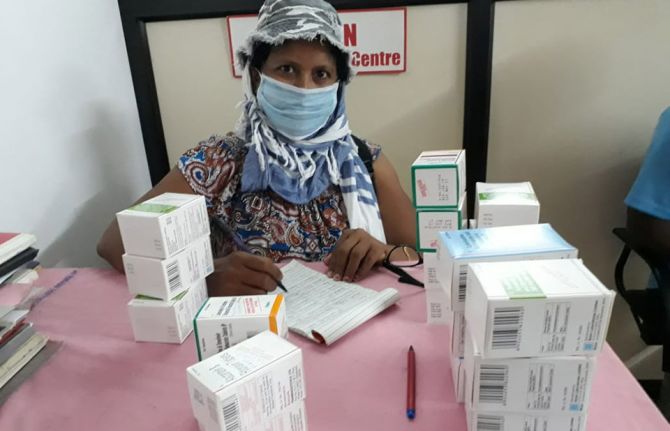
COVID-Blog
Mitigating the impact of the COVID-19 pandemic among people living with HIV in India
06 May 2020
06 May 2020 06 May 2020For the more than 3000 people, including 330 children and adolescents, living with HIV and on antiretroviral therapy in Goa, India, the COVID-19 outbreak is a time of worry—they are worried about COVID-19 and they are worried about being able to stay on their HIV treatment during the lockdown in India.
In order to respond to one of those worries, the team at the Human Touch Foundation, a community-based organization that provides care and support to children and adolescents living with HIV, has, since the start of the lockdown, organized a force of volunteers to deliver antiretroviral therapy to people’s doorsteps.

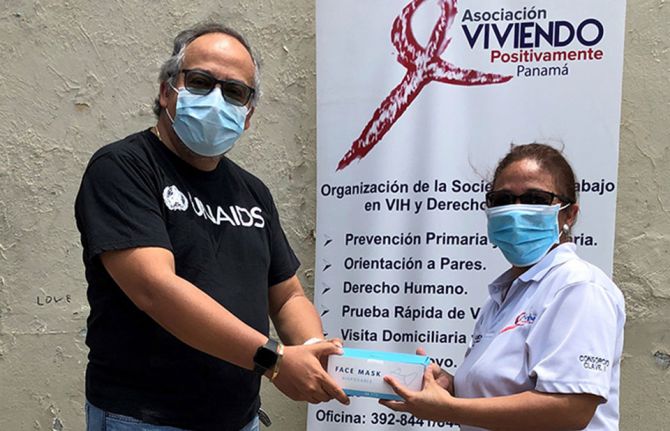
COVID-Blog
UNAIDS donates protective equipment to volunteers in Panama
06 May 2020
06 May 2020 06 May 2020The UNAIDS regional office for Latin America and the Caribbean donated personal protective equipment (PPE) including gloves and surgical masks to the Living Positive Association to protect volunteers who deliver antiretroviral drugs to their peers in different regions of the country during the coronavirus pandemic.
The equipment provided will help ensure that volunteers and focal points of the civil society organization remain healthy and can continue to provide the necessary assistance.
Read the news story (in Spanish)

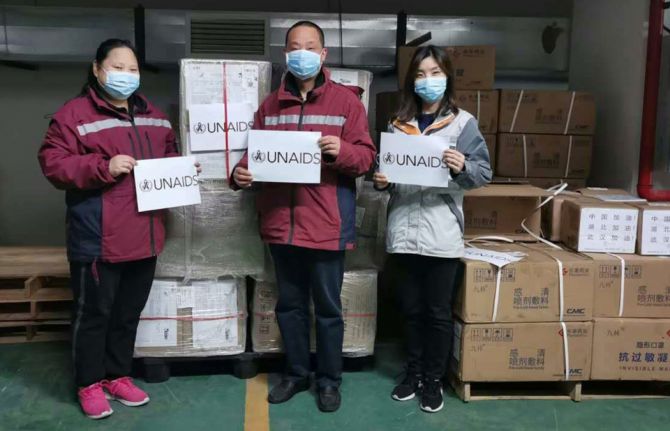
COVID-Blog
UNAIDS donates N-95 masks for frontline health workers in China
05 May 2020
05 May 2020 05 May 2020The UNAIDS China Office has donated 10,000 N-95 masks to the Hubei Provincial Center for Disease Control and Prevention in order to ensure continuity of services for people living with HIV and other key populations affected by COVID-19, including HIV testing and the distribution of antiretroviral and methadone treatment.
“The COVID-19 outbreak is having a major impact on people living with HIV and their service providers in Hubei Province,” said Sande Amakobe, Director of the UNAIDS China Office. “I hope our donation to Hubei CDC can support health personnel to stay safe and healthy so they can continue to provide effective services for people living with HIV.”
Even though the situation of the epidemic is gradually improving, according to Song Yi, an official working at Hubei CDC, “we are still in need of medical equipment and the donation from UNAIDS will fill the gap. We really appreciate the support from UNAIDS.”

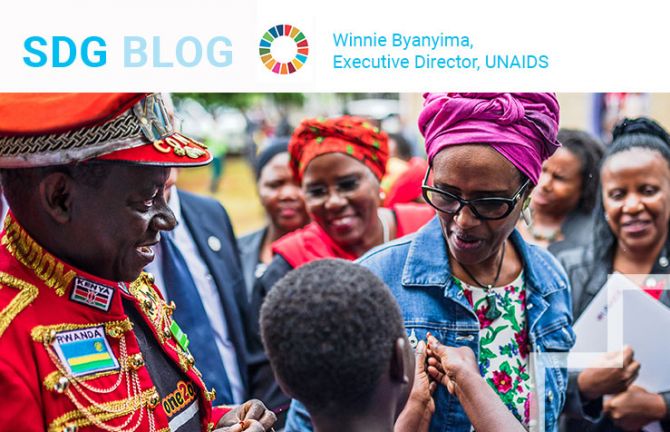
COVID-Blog
We must act together to beat COVID-19 in Africa
05 May 2020
05 May 2020 05 May 2020The COVID-19 outbreak has been placing unprecedented strains on sophisticated health systems in Europe and Asia, with overstretched medical staff struggling to treat their patients and intensive care facilities overwhelmed in rich countries. With cases rising in Africa, concerns are increasing on the impact on fragile health systems there. This crisis is already exposing glaring inequalities between the rich and the poor in the developed world, and it is about to reflect even greater inequalities between the North and the South.
Read the full opinion piece by UNAIDS Executive Director, Winnie Byanyima

COVID-Blog
Behind the Front Lines: human faces of the #COVID19 response
04 May 2020
04 May 2020 04 May 2020A series of portraits of women and men of the United Nations family, each contributing in their own way to the common fight against the coronavirus. Fahmida Khan is a Community Support Advisor at UNAIDS Pakistan.
Behind the Front Lines: human faces of the #COVID19 response.
— UN Geneva (@UNGeneva) May 4, 2020
A series of portraits of women & men of the UN family, each contributing in their own way to the common fight against the coronavirus.
Fahmida Khan is a Community Support Advisor at @UNAIDS Pakistan.#StrongerUNited pic.twitter.com/8mGnzP1Pcd

COVID-Blog
Paying tribute to care workers during an online Labour Day event
01 May 2020
01 May 2020 01 May 2020On 1 May 2020, the UNAIDS Executive Director Winnie Byanyima joined Oxfam Denmark to pay tribute to care workers during an online Labour Day event. Below are the transcripts of her video message.
"It’s an honour to join you to celebrate 1 May—the international day of workers. In the time of COVID-19, it is our frontline workers in hospitals, community health centres, care facilities, supermarkets, taxis and delivery vans who are risking their lives for us," said Ms Byanyima.

COVID-Blog
Safer sex in the time of COVID-19
01 May 2020
01 May 2020 01 May 2020The UNAIDS regional office for the Latin America and the Caribbean region has designed a set of graphics and audiovisual material with information about sex in the time of COVID-19.
Intended to be disseminated on social media channels in Latin America and the Caribbean, they provide information on issues related to sex, sexual relations and COVID-19.
The information is presented in a question and answer format, using a very simple language, practical advice, and scientific facts on best practices to decrease the risk of transmission of HIV, other sexually transmitted infections, and COVID-19 in this time of pandemic.
¿Se puede transmitir el coronavirus a través de las relaciones sexuales?
— ONUSIDA Latina (@OnusidaLatina) April 29, 2020
Todavía tenemos mucho que aprender sobre #COVID19 y el sexo.
Aquí https://t.co/rYLGSGqbZX te compartimos algunas respuestas para ayudarte a prevenir la transmisión del VIH, las ITS y el #Coronavirus. pic.twitter.com/zSekDb5IqC

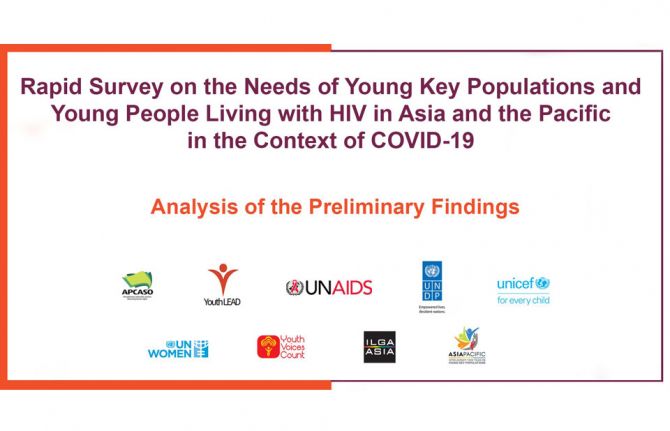
COVID-Blog
The coronavirus pandemic is negatively affecting the socio-economic status of young key populations and young people living with HIV in Asia-Pacific
01 May 2020
01 May 2020 01 May 2020The preliminary results of the survey launched by the Interagency Task Team (IATT) on young key populations (YKPs) in Asia and the Pacific to assess the needs and ability of young key populations in accessing information, medication and other HIV services during COVID-19 show that the pandemic is having a significant negative socio-economic impact on young key populations and young people living with HIV.
46% of the respondents expressed that the restrictive measures put in place to curb the spread of the pandemic are affecting their ability to access food supplies and basic commodities they need to survive. Another 46% reported that these measures led to a loss of income and employment.
In terms of HIV treatment, 51% said they are currently on antiretroviral (ARV) treatment. Of those, 30% have a 2-3 month refill of ARV medicines, 29% have only one month dose and 22% have treatment for 3 weeks or less. 17% of the respondents said they do not have ARV refills on hand and 43% of young people on ARV treatment don’t know if their country allows multi-month prescriptions for essential medicines. Finally, more than 64% are concerned about the exposure to COVID-19, while 50% have identified distance to ARV clinics and lockdowns as the main challenges in getting ARVs.
Based on the results of the survey, the IATT on YKP made a set of recommendations to improve access to information, access to HIV and other health services and access to social protection for young key populations and young people living with HIV. These include providing timely and appropriate information on HIV and COVID-19; finding innovative solutions to ensure access to multi-month dispensing of ARVs and other commodities such condoms; and ensure the provision of food and other social protection services and exploring the possibility to provide cash transfer to YKPs who have lost employment or in vulnerable condition.
These recommendations are aimed at informing countries as they develop their contingency plans to ensure continued access to HIV and other services for vulnerable and key populations while responding to the COVID-19 pandemic.
Check out the results of the survey and the recommendations here

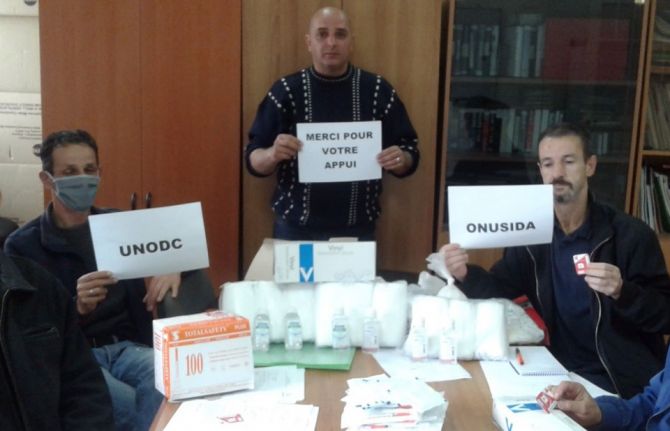
COVID-Blog
Ensuring continuity of HIV combination prevention for people who use drugs in Algeria
30 April 2020
30 April 2020 30 April 2020UNAIDS and UNODC are ensuring that people who use drugs in Algeria continue to be reached with HIV prevention and testing services amidst the coronavirus crisis.
With technical and financial support from UNAIDS and UNODC, the Ministry of Health together with 3 civil society organizations (AIDS Algerie, ANISS and APCS) are providing HIV prevention services to 908 people who use drugs in 3 sites of the country.
As part of the initiative, eighteen community health workers have received telephone cards, sanitizers, masks, and gloves to be able to safely provide HIV prevention and testing services as well as information about the COVID-19. The community health workers go twice a week to the NGOs premises to pick up the prevention materials. Then, they coordinate the provision of services and fix appointments by phone with the people who use drugs near their residences so they can provide them with HIV prevention services such as information materials, clean syringes, and condoms.

COVID-Blog
Ensuring that all people who use drugs and are living with HIV have access to treatment in Bangladesh
30 April 2020
30 April 2020 30 April 2020The AIDS/STD Programme in Bangladesh brought all stakeholders together to discuss the challenges posed by COVID-19 and the required measures for people living with HIV (PLHIV) and other key populations. UNAIDS and partners are working with the government to ensure that all PLHIV, including those among refugee populations, receive a three-month supply of antiretroviral (ARV) drugs.
UNAIDS also worked with WHO and Save the Children to build the capacity of case workers to ensure that all people who use drugs and are living with HIV, including those who are homeless, receive antiretroviral treatment regularly. Each case worker provides treatment to around fifteen to twenty people who use drugs and are living with HIV by either leaving weekly doses of HIV treatment and four-day supply of opioid substitution therapy (OST) with a caregiver for those who have a home or by paying daily visits to those living on the streets and taking them to the drop in centers to get the ARVs and OST.
Furthermore, UNAIDS is supporting the Network of People who Use Drugs (NPUD) in their efforts to generate funds through in-kind personal donations to help homeless people who use drugs and are living with HIV to access food and other livelihoods during the COVID-19 response.

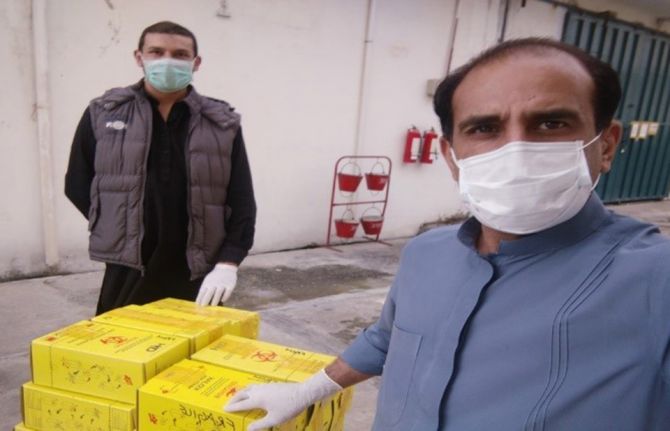
COVID-Blog
Keeping people in Pakistan on HIV treatment
29 April 2020
29 April 2020 29 April 2020The Pakistan Association of People Living with HIV (APLHIV) developed together with UNAIDS and Pakistan’s National AIDS Control Programme Common Management Unit for AIDS, TB and Malaria an Emergency Response Cell (ERC) in March. The ERC is working to ensure that everyone on HIV treatment gets an adequate supply of antiretroviral therapy, often delivered to their door.
The ERC’s Costed Contingency Plan groups all people living with HIV who are on treatment into three groups: red (people with a supply of antiretroviral therapy for less than two weeks); yellow (people with a supply of antiretroviral therapy for a month); and green (people with a supply of antiretroviral therapy for more than a month). These groups are then used to prioritize who receives packages of antiretroviral therapy, provided by the National AIDS Control Programme, through APLHIV and the Provincial AIDS Control Programme. The National AIDS Control Programme, through its Procurement and Supply Management Unit, provides packages of antiretroviral therapy to APLHIV, which are delivered by APLHIV through courier services to the doorsteps of people living with HIV who are unable to reach treatment centres.

COVID-Blog
Ensuring access to livelihoods for sex workers in Bangladesh
29 April 2020
29 April 2020 29 April 2020There are more than 100,000 female sex workers in Bangladesh and, as with other vulnerable populations, restrictions imposed in response to the coronavirus pandemic are disrupting their access to livelihoods.
Some brothel-based sex workers are accessing support from the local government, however, less than 4,000 of them live in brothels.
UNAIDS and UNICEF have been supporting the network of sex workers to develop income generating entrepreneurships run by sex workers to be able to compensate the loss of income due to COVID-19.
Also, through the network of sex workers and in collaboration with the Bangladesh Country Coordinating Mechanism (BCCM), UNAIDS has supported 23 community-based organizations of sex workers to procure protective commodities such as soap, masks, etc. during the initial stages of the response to COVID-19.

COVID-Blog
UNAIDS Goodwill Ambassador for Asia and the Pacific Pia Wurtzbach steps up to support the response to COVID-19
28 April 2020
28 April 2020 28 April 2020Pia Wurtzbach, Miss Universe 2015 and UNAIDS Goodwill Ambassador for Asia and the Pacific, has stepped up to support the COVID-19 response in The Philippines and in the region.
Among other initiatives, she has started a fundraising campaign with the aim of distributing 25,000 surgical and KN95 face masks to different hospitals in Metro Manila. So far 19,000 face masks have been distributed to more than 20 hospitals.
Ms Wurtzbach also participated in the online concert #RiseAsOnePH organized by LoveYourself in collaboration with UNAIDS and partners in support of the people on the frontlines and communities most affected by the pandemic. Together with Catriona Gray, Miss Universe 2019, Ms Wurtzbach emphasized the importance of guaranteeing access to HIV services, particularly HIV prevention, amidst the coronavirus crisis.
Finally, Ms Wurtzbach has taken her advocacy work to her social media platforms where she has been sharing and amplifying key messages and guidance on how to prevent COVID-19 and HIV.

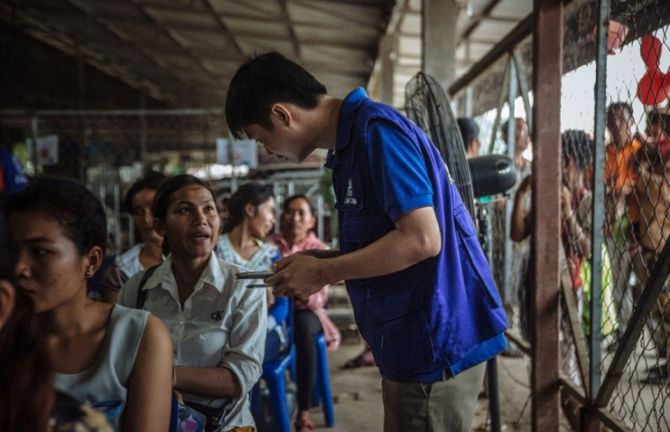
COVID-Blog
Providing protection and support to returning migrants in Cambodia
27 April 2020
27 April 2020 27 April 2020Due to the COVID-19 pandemic many businesses have closed in Thailand. As a result, more than 90,000 Cambodian migrant workers have lost their employment and have come back home.
The United Nations is working closely with Government of Cambodia to ensure that migrant workers and their families receive immediate assistance in terms of shelter and food. UNAIDS, together with WHO, UNICEF, and UNFPA is supporting the design of a rapid health assessment of returning migrants led by IOM. The assessment will look at the health needs of returning migrants, including access to HIV prevention and treatment services.
In addition, the United Nations and partners are working to include migrants in the social protection support package that is being proposed as part of the exceptional measures created by the Government to mitigate the impact of COVID 19 among vulnerable groups.

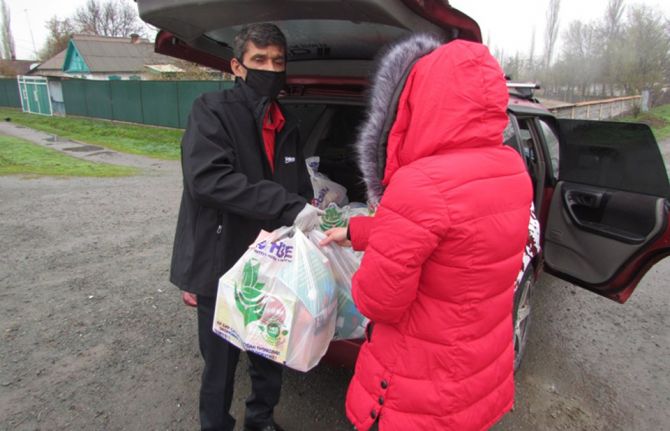
COVID-Blog
Helping people living with HIV with food supplies in Kyrgyzstan
27 April 2020
27 April 2020 27 April 2020The UNAIDS Country Office in Kyrgyzstan, with the support of a Russian technical assistance programme, is organizing the delivery of food packages, which will supplement other social assistance available for people living with HIV, to 130 families of people living with HIV who have been the most affected by their loss of earnings. Apart from the food, the packages also contain colouring books, marker pens and watercolour sets for the children of people living with HIV, to help them get through the lockdown.
“We hope that this small help will go some way to enabling people living with HIV to remain on treatment,” said Meerim Sarybaeva, the UNAIDS Country Manager for Kyrgyzstan.

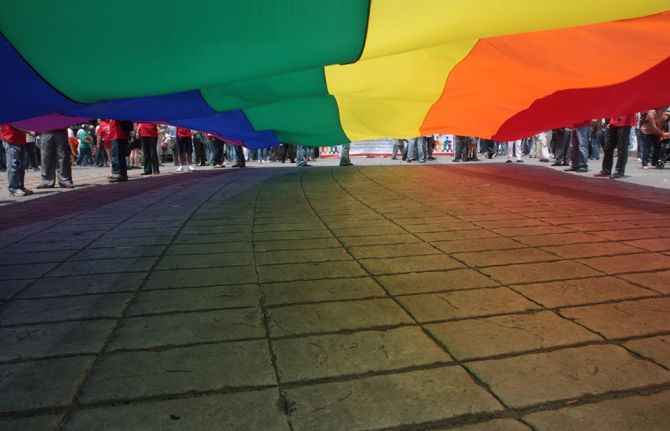
COVID-Blog
UNAIDS and MPact are extremely concerned about reports that LGBTI people are being blamed and abused during the COVID-19 outbreak
27 April 2020
27 April 2020 27 April 2020UNAIDS and MPact Global Action for Gay Men’s Health and Rights are extremely concerned that lesbian, gay, bisexual, transgender and intersex (LGBTI) people are being singled out, blamed, abused, incarcerated and stigmatized as vectors of disease during the COVID-19 pandemic. UNAIDS and MPact are also deeply troubled that this discriminatory action is compounding the challenges that LGBTI people already face in accessing their rights, including safe and quality health services.
“HIV has taught us that violence, bullying and discrimination only serve to further marginalize the people most in need,” said Winnie Byanyima, Executive Director of UNAIDS. “All people, regardless of their sexual orientation, gender identity or gender expression, are entitled to the right to health, safety and security, without exception. Respect and dignity are needed now more than ever before.”
UNAIDS and MPact call on governments and partners to protect, support and respect the human rights of LGBTI people during the response to COVID-19

COVID-Blog
Assisting people who use drugs to receive methadone treatment during COVID-19 lockdown in Kazakhstan
24 April 2020
24 April 2020 24 April 2020Accessing opioid substitution therapy (OST) and other harm reduction services for people who use drugs in Kazakhstan is becoming increasingly difficult due to the lockdown measures imposed in response to COVID-19.
People receiving methadone maintenance therapy in Kazakhstan take their daily dosage from the narcology clinics under direct observance of health staff. However, lockdown restrictions introduced on March 18 including restrictions of movement or the elimination of public transport services are making it very difficult for people on OST to get their daily medication and are even putting them at risk of being fined for violating such restrictions.
UNAIDS in cooperation with the Kazakh Association of People Living with HIV, the Kazakhstan Harm Reduction Network, the Republican Scientific Centre for Communicable Diseases and the Republican Scientific Centre of Mental Health have established a working group to find ways for people on OST to receive their essential drug treatment during the lockdown.
UNAIDS and partners put together a list of recommendation to the Ministry of Health which included the creation of special permits for people receiving OST and the extension of opening hours of the methadone sites in the morning, allowing all patients to have enough time to reach them.
As a result, people on OST have received special certificates issued by the public health authorities that allows them to go to the clinic without fear of being fined. Furthermore, a car has been made available by the government to facilitate transportation of people using methadone from their homes to the site and back for free. Additionally, patients might opt for in-patient free hospitalization in the narcology service for the period of lockdown.
UNAIDS is also advocating with the government of Kazakhstan for the establishment of a take-home methadone programme for people who use drugs to be able to receive their treatment on a weekly basis.

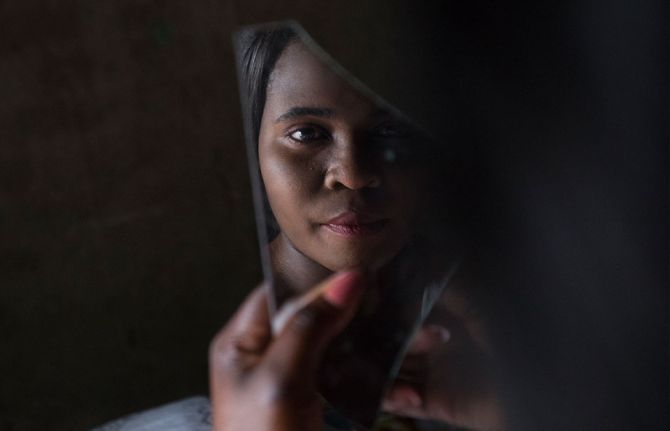
COVID-Blog
COVID-19 responses must uphold and protect the human rights of sex workers
24 April 2020
24 April 2020 24 April 2020The Global Network of Sex Work Projects (NSWP) and UNAIDS recently released a joint statement calling on countries to take immediate, critical action to protect the health and rights of sex workers during the COVID-19 pandemic.
The pandemic, as with other health crises, is exposing existing inequalities and disproportionately affecting people already criminalized, marginalized and living in precarious health and economic situations, often outside social protection mechanisms.
Around the world, sex workers are being forgotten in government responses to the COVID-19 crisis. As sex workers and their clients self-isolate, sex workers are finding themselves unprotected, increasingly vulnerable and unable to provide for themselves and their families.

COVID-Blog
Ensuring continuity of methadone maintenance therapy for people who use drugs in Viet Nam
24 April 2020
24 April 2020 24 April 2020The National AIDS Authority in Viet Nam (VAAC) has introduced the possibility for facilities distributing opioid substitution therapy to provide take-away dosages of methadone and buprenorphine to ensure continuity of services in the context of COVID-19. Methadone maintenance therapy (MMT) can be prescribed up to 7 days and Buprenorphine up to 10 days for clients who are quarantined at home or at mandatory quarantine facilities.
UNAIDS and UNODC provided policy and technical support for an innovative pilot project to provide take-home methadone maintenance therapy in Viet Nam. The approval of the pilot by the Ministry of Health facilitated the introduction of the current flexibilities in the provision of opioid substitution therapy in the context of COVID-19.

COVID-Blog
UNAIDS India partners with Reckitt Benckiser to distribute more than a million bars of soap to people living with HIV
23 April 2020
23 April 2020 23 April 2020In India, the UNAIDS Country Office has partnered with Reckitt Benckiser (RB) by joining forces to distribute over a million bars of soap to people living with HIV and key populations.
The soaps are being distributed through networks of people living with HIV, civil society organizations and community-based organizations as part of the national response to the coronavirus pandemic.

COVID-Blog
Information for people living with HIV on how to stay healthy in times of COVID-19
22 April 2020
22 April 2020 22 April 2020UNAIDS and the Pan American Health Organization have designed a set of postcards providing information on COVID-19 to people living with HIV in the Latin America and the Caribbean region.
The postcards, which are intended to be distributed on social media, provide information and advice on a wide range of issues including how to prevent COVID-19 infection as well as how to stay healthy living with HIV during COVID 19.
How to stay healthy if you are living with #HIV during #COVID19?
— ONUSIDA Latina (@OnusidaLatina) April 21, 2020
1/3 pic.twitter.com/LOguw9xzTH

COVID-Blog
Assessing the needs of young key populations in Asia and the Pacific in the context of COVID-19
21 April 2020
21 April 2020 21 April 2020The Interagency Task Team (IATT) on young key populations (YKPs) in Asia and the Pacific—a regional platform composed of UN agencies and networks of YKP, co-chaired by UNAIDS, UNDP and the Asia Pacific Council of AIDS Service Organizations (APCASO)—has launched a survey to assess the needs and ability of young key populations in accessing information, medication and other HIV services during the COVID-19 pandemic.
The results of the survey will be used to inform countries as they develop their contingency plans to ensure continued access to HIV and other services for vulnerable and key populations while responding to the COVID-19 pandemic.
The outcomes of the survey are also expected to help advocate for local solutions, lead by young people from key populations and young people living with HIV, that are specifically designed to meet the needs of young people.
The survey can be accessed here

COVID-Blog
UNAIDS develops a set of tips on how to report responsibly about COVID-19
21 April 2020
21 April 2020 21 April 2020In Papua New Guinea, people infected with COVID-19 have raised concerns about how certain media stories and other individual comments on social media platforms are disregarding their right to privacy by disclosing personal information that is generating a climate of stigma and discrimination against them.
In order to help the media to tell stories about COVID-19 in a way that does not harm people infected, UNAIDS has created a set of social media postcards with tips on how to report responsibly. The cards highlight the importance of anonymity, avoiding the use of sensationalist language, reporting accurate information and using language that does not discriminate and stigmatize people who have tested positive for COVID-19.
UNAIDS also created a postcard for people talking about COVID-19 on social media. The card emphasizes the need to share accurate information and not rumours, to challenge myths and stereotypes, and to never reveal a person’s identity without their consent.
Here are tips on how to report through the media or to share on social media in a way that spread FACTS not FEAR #COVID19 #PNG @UNAIDS_AP @UNAIDS pic.twitter.com/TW99GuatOE
— UNAIDS PNG (@unaidsPNG) April 15, 2020

COVID-Blog
UNAIDS and Reckitt Benckiser join forces to distribute hygiene packs to people living with HIV during the COVID-19 outbreak
20 April 2020
20 April 2020 20 April 2020UNAIDS Regional Support Team for Eastern and Southern Africa and Reckitt Benckiser have today joined forces to distribute more than 195 000 “hygiene packs” to people living with HIV in the eastern and southern African (ESA) region. Twenty-five thousand additional packs will be supplied to Nigeria and Egypt.
The packs consist of a three-month supply of Dettol soap and Jik surface cleaner and will be distributed in 19 ESA countries through UNAIDS Country Offices and networks of people living with HIV as part of efforts to reduce exposure to the impact of COVID-19 among people living with HIV.

COVID-Blog
Helping stranded tourists and students access HIV treatment in Asia and the Pacific
20 April 2020
20 April 2020 20 April 2020The UNAIDS regional support team for Asia and the Pacific has received several requests for help from non-nationals living with HIV in Japan, South Korea, Thailand, Malaysia and Sri Lanka through social media platforms. Many of them are tourists who were unable to return to their countries or students and all were running out of HIV treatment and unable to refill their medicines due to the COVID-19 situation.
The UNAIDS Asia-Pacific office connected these individuals to civil society organizations or local clinics in each of these countries where they were able to access the antiretroviral medicines.

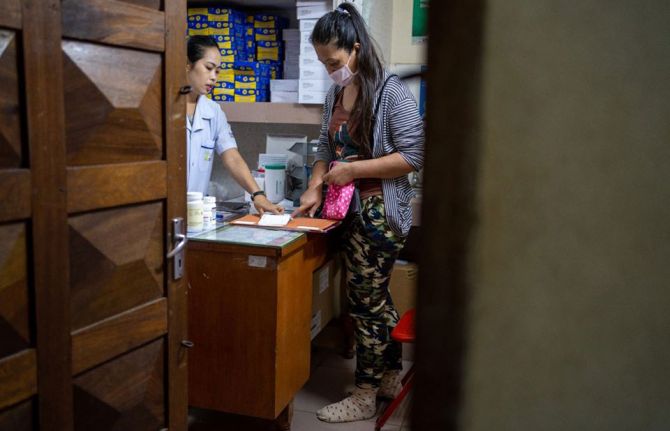
COVID-Blog
Understanding the needs of people living with HIV in Cambodia
19 April 2020
19 April 2020 19 April 2020UNAIDS Cambodia, in collaboration with community organizations of people living with HIV such as ART Users Association (AUA) and the Cambodian People living with HIV Network (CPN+), launched a rapid survey on 15 April 2020 to understand the actual situation of people living with HIV in the country in relation to the COVID-19 pandemic and to assess their needs in terms of information, access to antiretroviral treatment, medical care or other social services.
The results of the survey will inform the national HIV programme and key partners on the barriers that people living with HIV are currently facing and will help identify actions to mitigate the impact of the pandemic.
The survey can be accessed at https://www.surveymonkey.com/r/5SWTDZL

COVID-Blog
COVID-19 shining a light on painful inequalities like healthcare
19 April 2020
19 April 2020 19 April 2020Winnie Byanyima, UNAIDS Executive Director, said that "to fight COVID-19 and win, we must challenge inequalities. That's how we can sustain recovery."
She is pressing leaders to act on three important actions, including protecting and rewarding health workers fairly, and ending user fees. "We won't stop Covid-19, if some people can’t afford testing or treatment," she added. Thirdly, remove the burden of debt that still binds the hands of developing countries, not just by shifting repayments to next year but through cancellations.
Most low-income countries are already highly-indebted. Africa’s debt has been increasing every year and is now about 60% of the continent’s gross domestic product. "It is immoral to push highly-indebted countries to take more loans to fight an existential threat that the whole world is facing. A broad and coordinated debt relief process is urgently needed not only to respond to the Covid-19 crisis but to shorten the recovery period and create conditions for growth."

COVID-Blog
Massive prison amnesty in Myanmar in response to COVID-19
17 April 2020
17 April 2020 17 April 2020On 17 April, the President of Myanmar agreed to release more than 25,000 prisoners, including drug users arrested in possession of a limited amount of drugs or who did not report to drug treatment services as required by law.
UNAIDS is following up with the Ministry of Health and Sports and the nongovernmental organizations who are involved in the provision of health information and referral for care to those released, including for people who use drugs and for people living with HIV who are on Antiretroviral Therapy (ART). The latter are being provided up to 6-months antiretrovirals (ARV) to reduce the need for them to go to treatment centres in the coming period with stay home or lock-down orders for the whole population or for certain regions-states.
Earlier in the month, civil society organizations and the United Nations had sent letters to the President calling for the decongestion of detention facilities in response to COVID-19.

COVID-Blog
Devising mechanisms for home delivery of HIV treatment in Lao PDR
17 April 2020
17 April 2020 17 April 2020In order to mitigate the impact of the lockdown on HIV services, the Centre for HIV/AIDS and STI under the Ministry of Health requested UNAIDS to support the development of a concept note to establish a mechanism of home delivery to provide HIV treatment to people living with HIV who are not able to go to the healthcare facilities due to restriction in movements imposed by the government.
UNAIDS worked with two civil society organizations—Lao Positive Health Association and the Association for People Living with HIV (APL+)—to find a workable approach for the provision of ARV drugs.
As a result, the two civil society organizations are now working, under the umbrella of the Ministry of Health, with 11 health facilities throughout the country to ensure 839 people living with HIV receive their treatment at home or at a specified location of their convenience.
Community members together with healthcare staff at health facilities reviewed the list of people living with HIV who had appointments with doctors scheduled for April 2020—the lockdown period established by the government. The list helped identify the areas, treatment and budget needed for the home delivery initiative. Community members would then get an authorization letter to travel around their province ensuring treatment continuity.

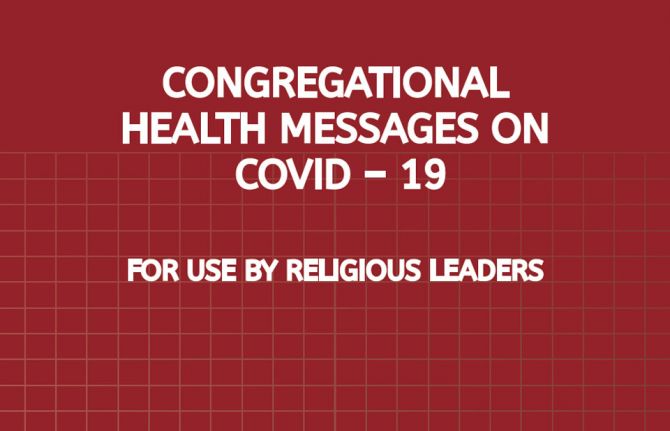
COVID-Blog
Congregational health messages on COVID-19 for religious leaders
16 April 2020
16 April 2020 16 April 2020The Government of Kenya in partnership with Faith-based organizations and UNAIDS has produced a booklet for religious leaders in response to COVID-19.
The booklet contains a set of messages to be used during sermons and other religious activities. The messages are intended to provide accurate facts about COVID-19 and debunk myths. They also aim at rallying congregants to respond with love, kindness, and care rather than stigma and discrimination. Finally, the booklet calls on congregants to follow the government guidelines and recommendations on how to prevent COVID-19 infection. The booklet uses Biblical scriptures and quotes from Quran, Hindu, Bahai and other faiths to reinforce the messages.
As a member of the faith sector working group, UNAIDS provided the government and partners with support on the conceptualization and writing of the document including technical review and input.

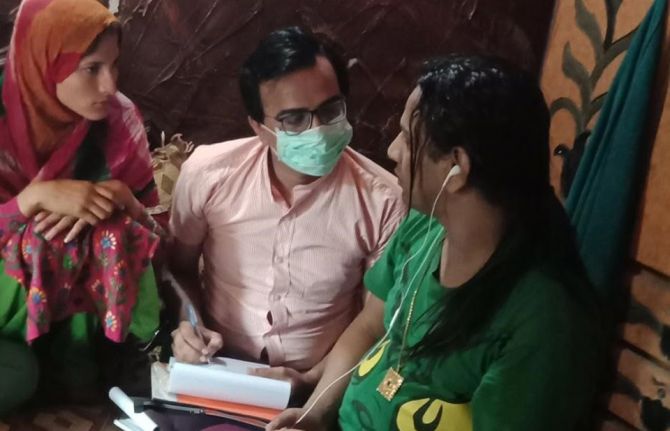
COVID-Blog
Keeping HIV treatment available in Pakistan during COVID-19
15 April 2020
15 April 2020 15 April 2020Since an uninterrupted supply of antiretroviral therapy is essential for people living with HIV, the Pakistan Common Management Unit for AIDS, TB and Malaria, in collaboration with UNAIDS and other partners, has established virtual platforms and helplines in order to ensure that coordination is continued. An emergency stock of antiretroviral therapy has been made available for people living with HIV for the next two months and a buffer stock is being made available through the Global Fund to Fight AIDS, Tuberculosis and Malaria in order to avoid interruptions in the event that imports of medicines are disrupted.
“We are working closely with the Association of People Living with HIV, federal and provincial governments and the UNAIDS family to monitor the situation and quickly help address barriers in accessing life-saving HIV services in these extremely challenging times of the COVID-19 crisis,” said Maria Elena Borromeo, the UNAIDS Country Director for Pakistan and Afghanistan.
Related resources

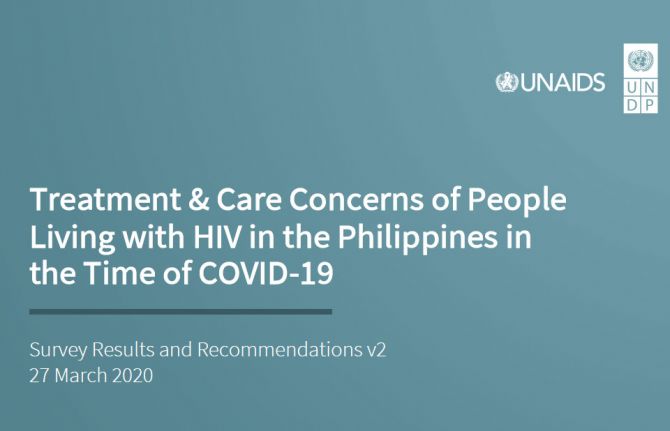
COVID-Blog
Assessing the needs of people living with HIV in the Philippines
15 April 2020
15 April 2020 15 April 2020In the Philippines, UNAIDS and UNDP developed a rapid survey to assess the different issues that are affecting people living with HIV under the enhanced community quarantine due to COVID-19.
Results from the survey show that the suspension of public transportation impacted the most on accessing treatment. While a number of issues were logistics-related, respondents also reported anxiety from loss of income, fears from exposure to COVID-19 while immune-compromised, antiretroviral treatment stockouts, disclosure of one’s HIV status in checkpoints, and the lack of access to psychosocial support, among others.
Based on these results, UNAIDS and UNDP have come up with a set of recommendations that were presented to the Department of Health for timely and appropriate action. The results of the survey magnified the need to develop a comprehensive treatment and care plan for people living with HIV during emergencies and crises, to ensure access to treatment, mental health services, social protection measures and protection of human rights of affected communities.

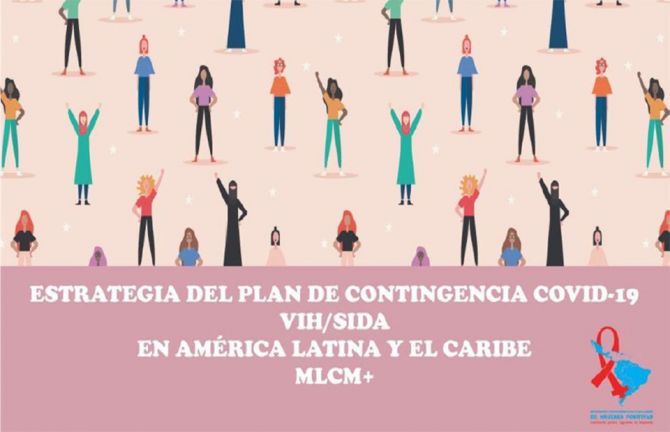
COVID-Blog
A community approach to curb the impact of COVID-19 among people living with HIV in Latin America and the Caribbean
14 April 2020
14 April 2020 14 April 2020The Latin American and the Caribbean Movement of Women living with HIV (MLCM+) with support from UNAIDS conducted a virtual training among community health volunteers from 17 countries in the Latin America and the Caribbean region on how to prevent transmission of COVID-19 and how the new pandemic may have an impact on the quality of life of people living with HIV.
A first capacity building session was held on 09 April 2020 with 350 volunteers from 17 countries in the Latin America and the Caribbean region that will provide information on COVID-19 and HIV-related issues to groups of people living with HIV and other key populations. Other training sessions are planned to happen shortly.
Related resources

COVID-Blog
UNAIDS Executive Director, Winnie Byanyima talks about COVID19
13 April 2020
13 April 2020 13 April 2020UNAIDS Executive Director, Winnie Byanyima participated in a TV special on COVID19 on Sunday 12 April organized by NDTV of India. Ms Byanyima noted that the pandemic is a human crisis of an unprecedented scale that is taking away lives, livelihood, and destroying economies. She called on governments to quickly strengthen their health systems and to begin to trace, isolate and treat all COVID-19 cases.
Asked about the lessons learned from the response to HIV, Ms Byanyima stressed the need to empower communities and involve them in the response to COVID-19; never compromise on human rights; remove all forms of stigma and discrimination; and support vulnerable and marginalized groups.
Watch the full interview here:

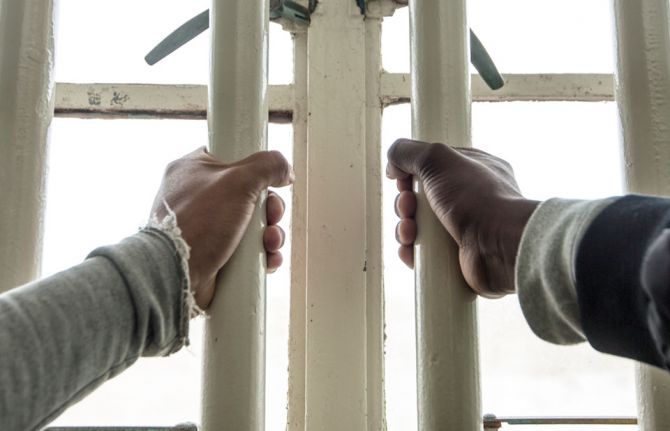
COVID-Blog
COVID-19: urgent need to enhance measures in Myanmar prisons and detention facilities to prevent outbreaks
10 April 2020
10 April 2020 10 April 2020Social activists and nongovernmental organizations have called upon the Myanmar Government to adopt immediate additional measures to prevent COVID-19 outbreaks in the country’s prisons, including the release of all prisoners with underlying medical conditions as well as those detained for non-violent offences.
The call to action, which contains a set of key recommendations and priority interventions, is the result of a collective process initiated by civil society organisations with technical guidance and inputs from UNAIDS, WHO and other organisations.
A joint United Nations letter, signed by UNAIDS, UNODC, UNDP and UNICEF, was also sent to the President of Myanmar on 9th April requesting the Government to take the necessary measures to release detainees from the country’s detention facilities in light of the COVID-19 pandemic and to protect the health and safety of those held in such facilities.

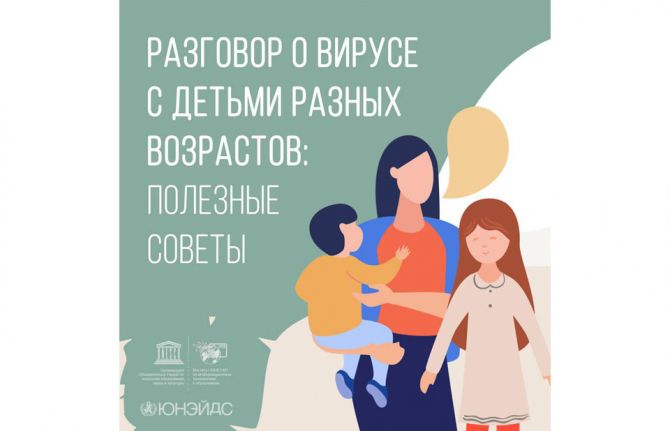
COVID-Blog
UNAIDS-UNESCO information cards
08 April 2020
08 April 2020 08 April 2020The UNAIDS regional office for Eastern Europe and central Asia together with UNESCO IITE have developed a set of information cards providing accurate and evidence-based information about how to communicate and overcome the coronavirus in family settings. The cards talk about how to prevent infection, how to talk about the virus and the current situation with children of different ages, how to work and study in isolation, and how to prevent and address COVID-19-related stigma and discrimination in a simple and clear language.
The cards, which are currently being translated into other regional languages, are intended to be disseminated through social media networks, ministries of education, youth media and other channels.


COVID-Blog
New innovations map to strengthen the response to COVID-19
08 April 2020
08 April 2020 08 April 2020A Coronavirus Innovation Map has been launched by StartupBlink together with the Health Innovation Exchange—a UNAIDS initiative to leverage the potential of innovations to improve the health of all—and the Moscow Agency of Innovations.
The map is a directory of hundreds of innovations and solutions globally that could support and strengthen the response to COVID-19, helping people to adapt to life during the COVID-19 pandemic and to connect innovators so they can collaborate on solutions.

COVID-Blog
UN Volunteers support joint COVID-19 response in Kenya
08 April 2020
08 April 2020 08 April 2020Edwin Opwora, a UN Volunteer with UNAIDS in Kenya, is part of the COVID-19 UN team embedded with the Kenyan government. He is based at the office of the government spokesperson, and tasked with collecting and disseminating timely, accurate and reliable information on COVID-19.
"We started by developing a communication strategy to guide our approach and key messages for dissemination," says Mr Opwora. "But as we were developing the communications strategy, I noticed that vulnerable populations, including people living with HIV, were not included. With support from UNAIDS colleagues, we revised it to ensure that vulnerable and disadvantaged populations were also included in our communication strategy," added Mr Opwora.
Mr Opwora volunteered to join the digital communications group, developing digital content and monitoring social media for fake news, myths and misconceptions. He also responds to frequently asked questions from the general public. Mr Opwora noted that initially, there was a lot of confusion because the public didn’t have enough information about the Coronavirus. However, with consistent dissemination of the right information, more Kenyans have become increasingly aware of the basic guidelines given by the government.
Winnie Wachiuri is also a UN Volunteer with UNAIDS, serving as a programme officer. "I am seconded to the Emergency Operations Center at the Ministry of Health to support data management and contact tracing. I mainly support evidence-based approaches to manage the COVID19 outbreak, and hope my inputs will contribute to containing and managing this pandemic," said Ms Wachiuri.
As #COVID19 cases increase in #Africa, UN Volunteers in #Kenya have been re-assigned to directly support the Kenyan Govt's response to the #coronavirus. Edith & Edwin, serving with @UNFPA & @UNAIDS, are two of these UN Volunteers. Read about their work! https://t.co/l6ooHn8HhC pic.twitter.com/5lJyn0Fb1i
— UN Volunteers (@UNVolunteers) April 8, 2020


COVID-Blog
Ensuring that people living with HIV in the Philippines have access to treatment during COVID-19
08 April 2020
08 April 2020 08 April 2020The COVID-19 pandemic and the lockdown imposed by the Government of the Philippines to curb the spread of the disease are impacting the lives of people living with HIV across the country, creating a serious challenge to accessing life-saving antiretroviral therapy. To help address those challenges, civil society organizations have come together to support people living with HIV to access treatment.
“UNAIDS has regularly coordinated with civil society organization since the beginning of the COVID-19 outbreak, providing technical guidance and ensuring synergy with the efforts of the government,” said Louie Ocampo, UNAIDS Country Director for the Philippines.
The United Nations Development Programme and UNAIDS have developed a rapid survey to assess the different issues affecting people living with HIV in the Philippines. In addition to access-related issues, the results of the survey show the urgent need to protect human rights and facilitate access to mental health and social protection services. The findings have been shared with the government in order to ensure that actions are based on the constantly evolving situation in the context of the COVID-19 pandemic.

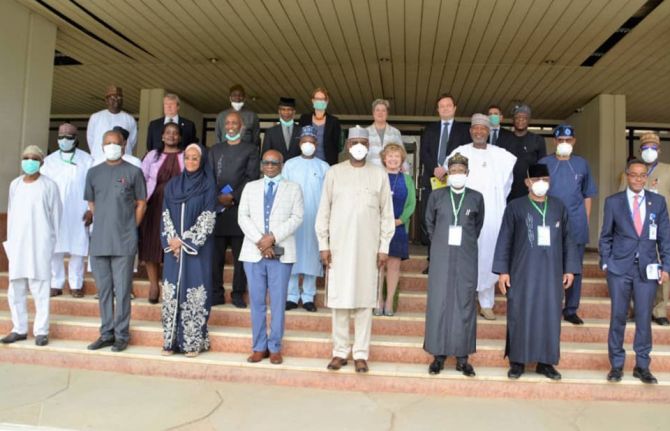
COVID-Blog
UNAIDS facilitates establishment of the COVID-19 basket fund in Nigeria
08 April 2020
08 April 2020 08 April 2020The United Nations in Nigeria and the Nigerian Government launched the COVID-19 Basket Fund to harmonize investments in a national pandemic response plan. UNAIDS and UNDP were tasked to facilitate the establishment of the COVID-19 Basket Fund. The Basket Fund will serve as the one COVID-19 financing and investment platform for diverse stakeholders to channel their financial support to ensure an efficient, effective and impactful response to the coronavirus pandemic.

COVID-Blog
Training of journalists on evidence-informed and ethical journalism
03 April 2020
03 April 2020 03 April 2020UNAIDS supported the training of 50 Central African journalists on evidence-informed and ethical journalism in the response to #COVID2019 & other pandemics.
Facts, not fear. Compassion, not stigma. Great to work with MoH, @UN_CAR, @ONU_RCA, @OMSCentrafrique, @UNICEF_CAR on evidence-informed and ethical journalism in the response to #COVID2019 & other pandemics. https://t.co/NETbU4SPJg
— Patrick Eba (@EbaPatrick) March 26, 2020







